Bornean bearded pigs faced a massive decline from African swine flu, rarely seen in Tanjung Puting National Park since. However, recent footage from our camera traps has shown the species is slowly making a comeback!
Drones taking flight for habitat protection
Orangutan Stories: Death and Birth - The Circle of Life in the Wild
2024 highlights: A look back on our conservation achievements together for orangutans, forests, and people
Great apes also under threat from COVID-19
In light of the recent COVID-19 outbreak, it is not just ourselves who may be at risk from infection, but in fact all great apes. Today, people worldwide are taking necessary precautions to halt the spread of the virus to one another, and we must use these same principles in order to prevent other susceptible species from becoming a victim of the pandemic.
At this time it is not known what effect this virus has on orangutans, however when we consider that they share 97% of their DNA with humans, and that Bornean, Sumatran, and Tapanuli species are classified as critically endangered, there is a genuine threat to these already vulnerable populations.
In an effort to temper the virus’s spread, eco-tourist sites such as Tanjung Puting National Park (above) have been temporarily closed to Indonesian and foreign visitors, much like well-known sites in Africa which have been closed to mountain gorilla viewings. At the Orangutan Foundation meanwhile, our teams continue to follow current safety measures in London and Indonesia.
In today’s unsteady climate, our priority of safeguarding orangutans and their forest environment remains a constant as we also protect our staff. Our habitat protection and restoration teams have taken note of the current warnings, and those caring for orphaned orangutans in our soft-release programme as always will continue to wear protective suits, gloves, and masks in the Lamandau Wildlife Reserve.
During this uncertain time your support is pivotal to our ongoing work more than ever, which is why on behalf of all of us at the Foundation, we would like to thank you for helping us do all we can to protect orangutans from this threat to their future.
Celebrating new life whilst battling to save orangutan habitat
This week, our Monday motivation was this incredible footage of orangutan Max with her infant Monti, sent by our staff who are as excited about this new addition as we are. However, the next day, we heard from our Patrol Manager, Jakir, that fires were once again raging close to the Lamandau Wildlife Reserve, Indonesian Borneo. One moment we are celebrating new life, the next we are battling to save the habitat.
Thankfully the wildlife reserve is 158,000 acres in size and the fires are well away from the orangutan release camps. Our 8 manned guard posts, around the reserve, means our patrol staff can respond quickly to keep the reserve safe and prevent the fires from spreading.
Habitat protection is our priority. Please donate to our appeal to help us keep forests standing and orangutans in the wild.
Rescued and released orangutans of Lamandau Wildlife Reserve
Our vet, Dimas and programme manager, Iman, have been on their weekly visits to the orangutan release camps in the Lamandau Wildlife Reserve, Central Kalimantan, Indonesian Borneo. They check on the orphaned young orangutans and ensure the good health of the released orangutans. Their journey took longer than usual because the river levels are very low, due to lack of rain. Instead of travelling by speedboat it was completed in a shallow longboat (or klotok, as they’re called in Indonesia). Our youngest orangutans are cared for at Camp JL and include Timtom, Nyunyu, Adib, Mona (photo below) and Boy. Dimas gave them their multivitamin injection to keep them healthy but they are all well and active.
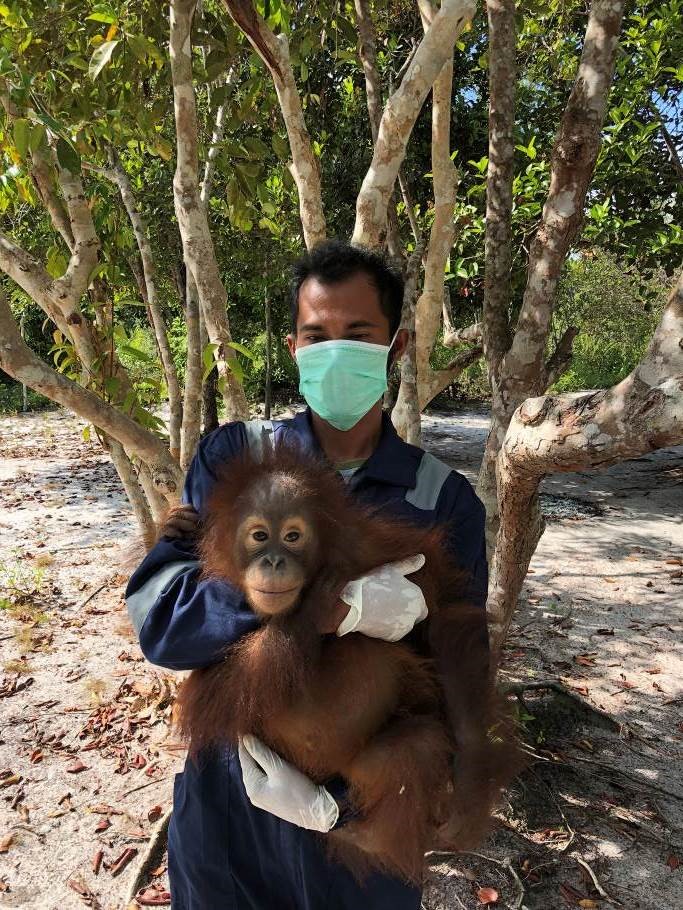
In the afternoon they continued by longboat to Gemini Camp. This is where blind orangutan Aan lives. Aan was shot and can never be returned to the wild. Her enclosure recently had new ropes (see below).
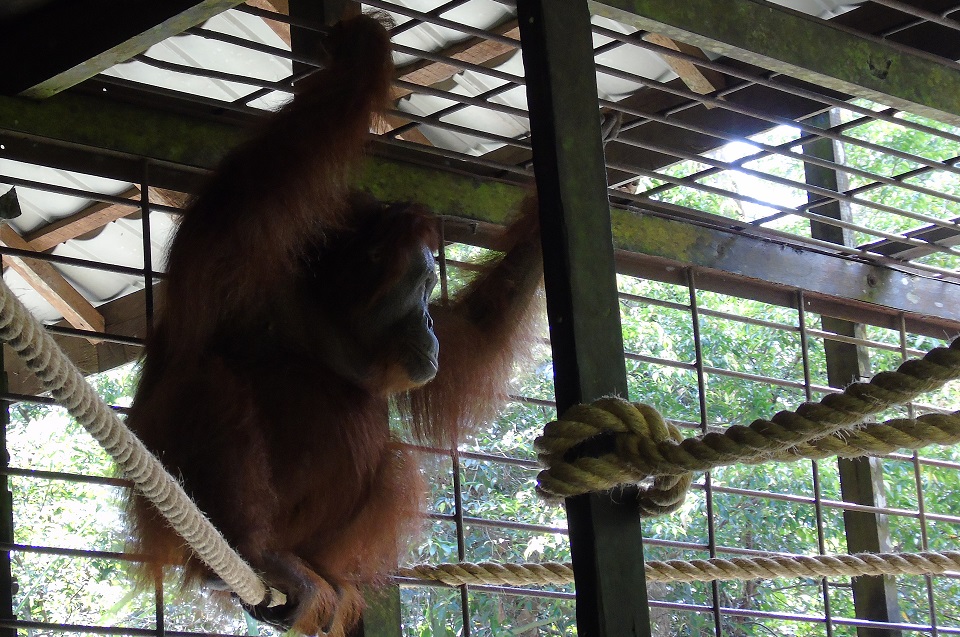
They walked from camp through the forest to the feeding site, where supplementary fruit is provided. Dominant male, Bangkal came to feeding along with female and infant orangutans; Ilik and Izzy; Hola and Happy; Ebony and Ekon (photos below); and Passion and Paris. Max was also seen with her newborn infant, now named Monti and they seemed well.
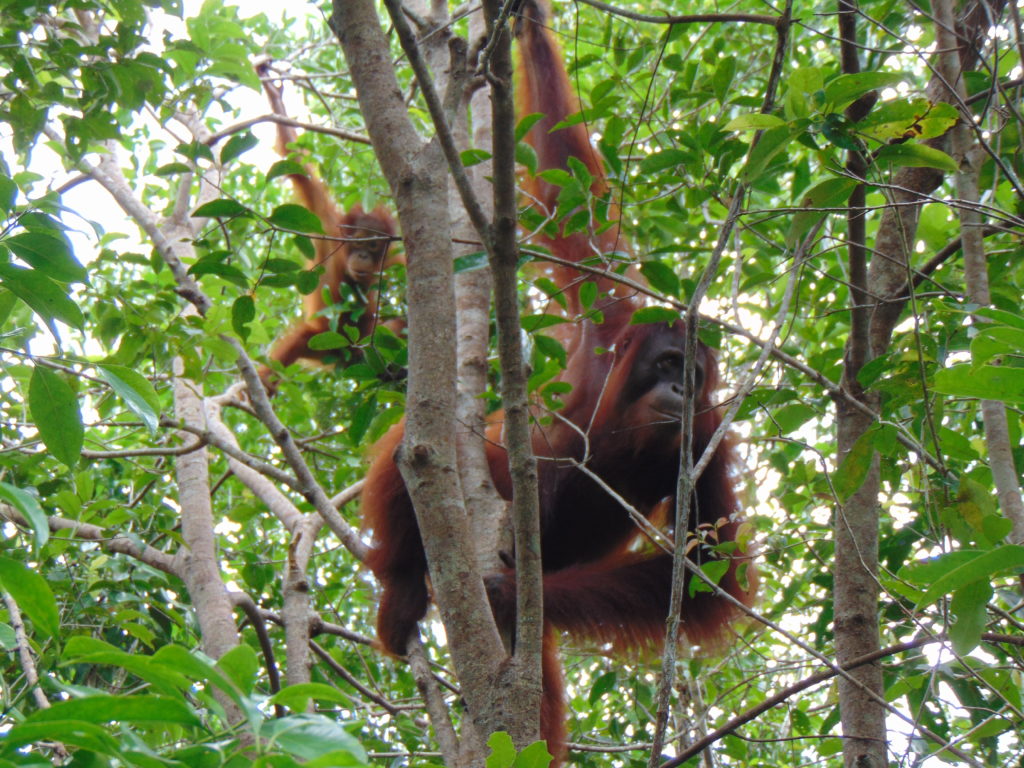
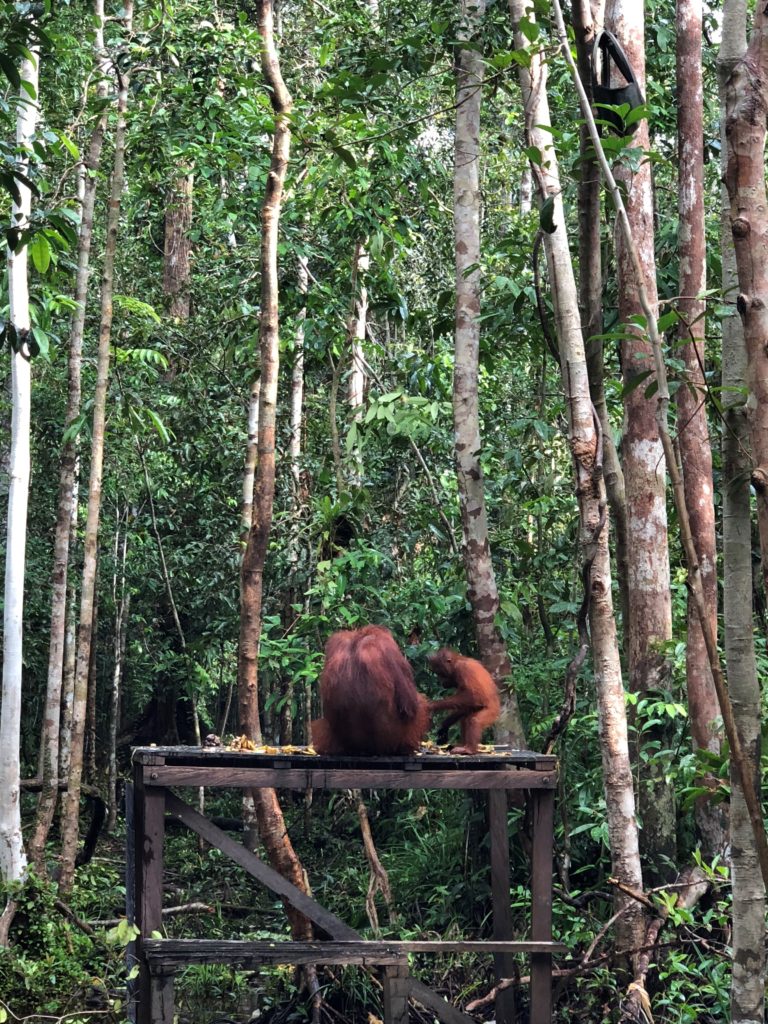
A few days later they went to Camp Buluh, to check on orphan orangutans Okto and Syifa. Okto had injured one of his fingers a few weeks ago but after receiving treatment the inflammation has reduced and is healing well.

Both Okto and Syifa very active and enjoy playing together. Okto was given a final anti-inflammatory injection and both orangutans received their multivitamins.
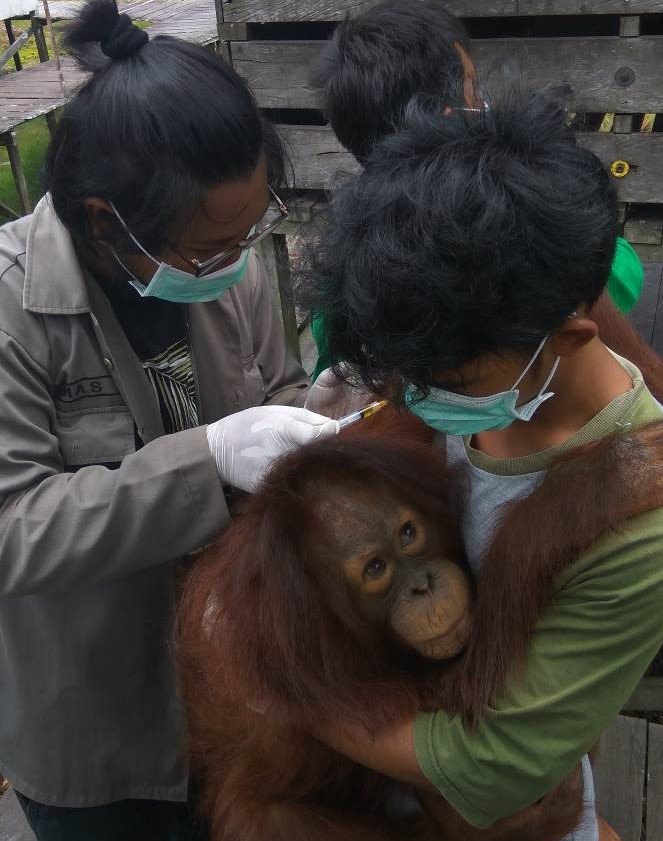
Conditions are very dry at present and so our guard post staff are vigilant and on alert for fires. All the guard posts are equipment with fire-fighting gear and our staff are trained enabling them to respond quickly and effectively to extinguish fires.
Please help us to keep forests standing and orangutans in the wild. You can support our work by donating or adopting Okto or Mona.
Orangutan Foundation celebrating International Orangutan Day in Central Kalimantan
International Orangutan Day (19th August) aims to increase global awareness about orangutans and their tropical forest habitat. This weekend, Orangutan Foundation, in Central Kalimantan, orangutan capital of the world, have a festival of activities arranged for hundreds of people. Members of the youth groups, Kalteng Indonesian Conservation Cadre Communication Forum (FK3I) and the Student Nature Lovers, throughout Kowaringin Barat Regency will join in. We’ll be celebrating orangutans and conservation with overnight camping and art activities. Five local kindergartens are taking part in a colouring contest. We’ve also organised a car-free day in the town of Pangkalan Bun to highlight this global day celebrating orangutans. Ensuring awareness is achieved here, means that a real difference can be made.
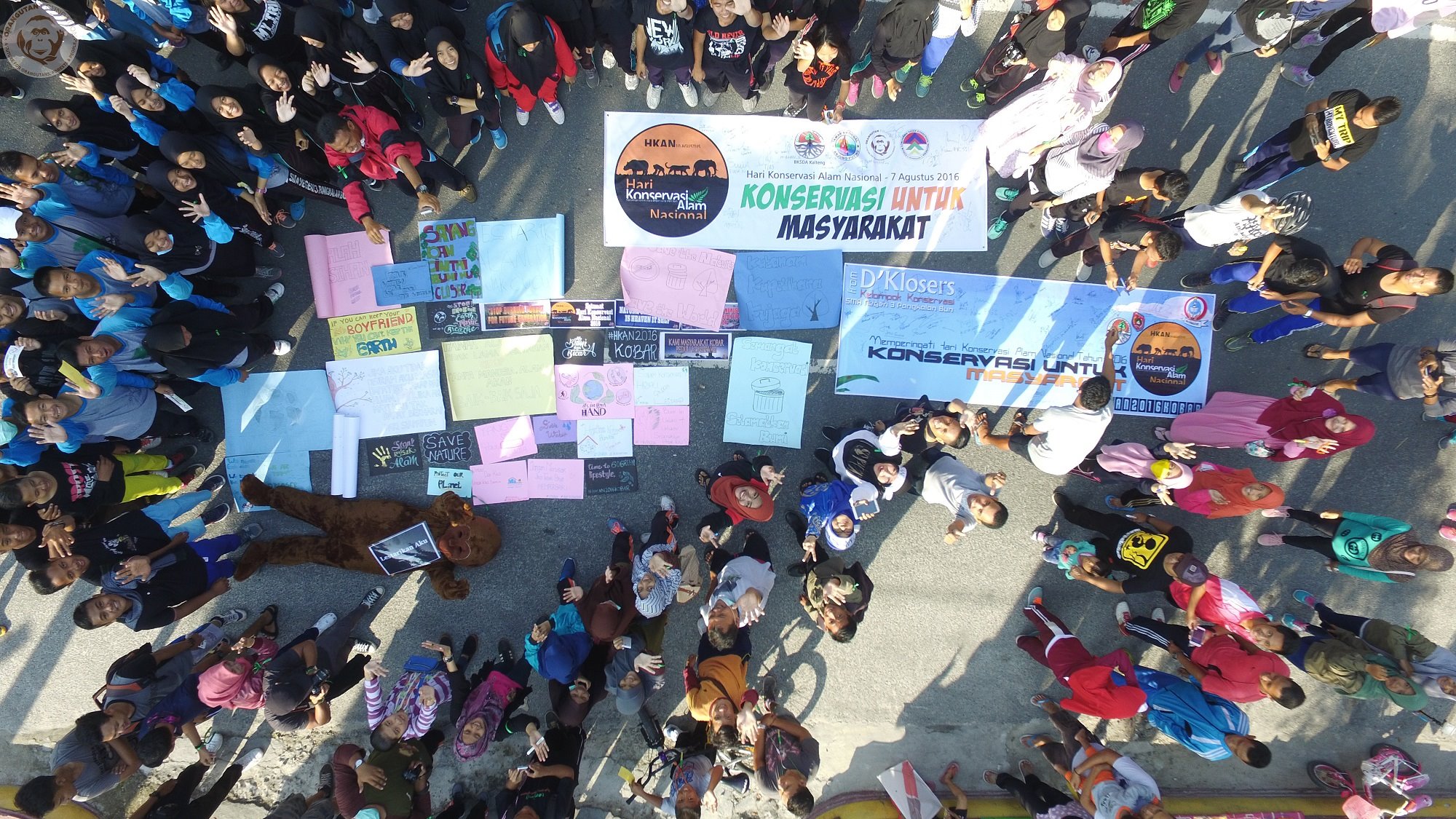
The overall aim is to increase community awareness about the environment and the presence of wild orangutans in the surrounding forests. Leaflets will be distributed informing people how to avoid human-orangutan conflicts.
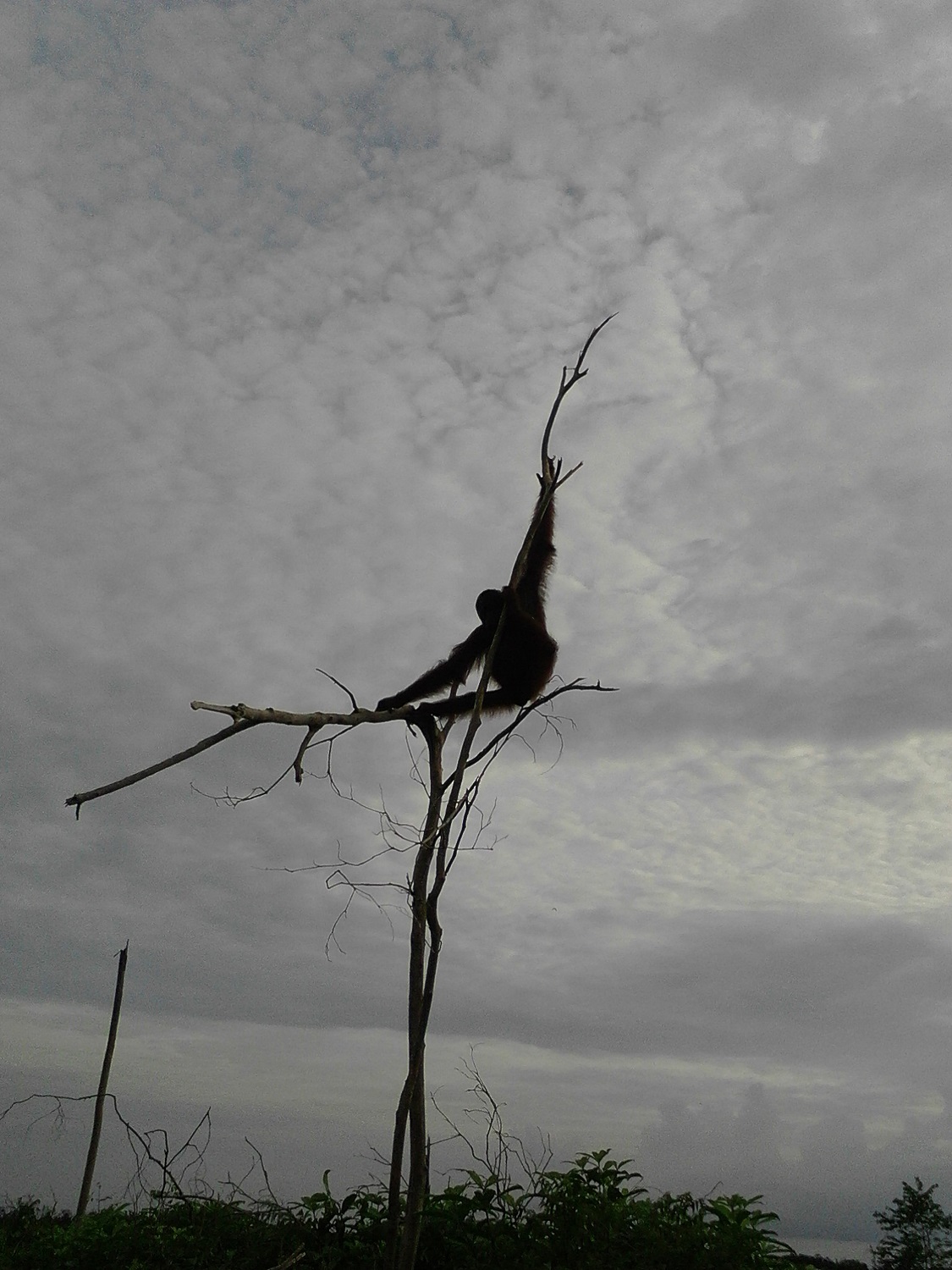
This action is needed more now, than ever before.
Watch this space for news and images of how the festivities went.
Wild orangutan rescued and moved to safety
When our staff arrived at the oil-palm plantation they found the orangutan in an area of forest, on the riverbank of the plantation. We had been called in to help by BKSDA SKW II Pangkalan Bun (government agency for wildlife) who had received reports from an oil-palm plantation of an orangutan in their plantation. It was decided to capture the orangutan and move her to the protected Lamandau Wildlife Reserve, to avoid potential conflict.
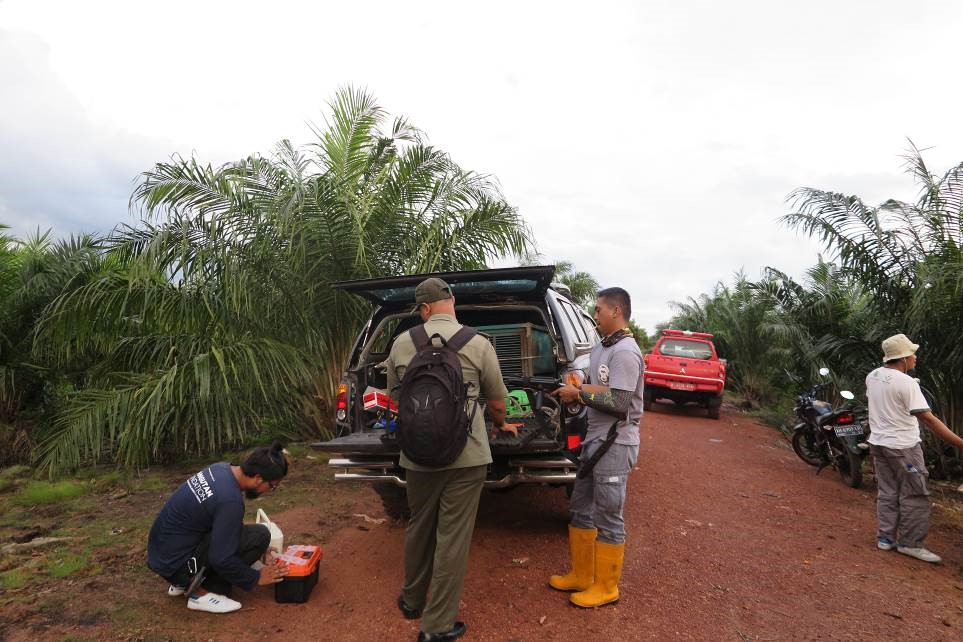
The orangutan, who they identified as female, had made and was resting in a nest. This made it easier to dart her as she wasn’t moving.
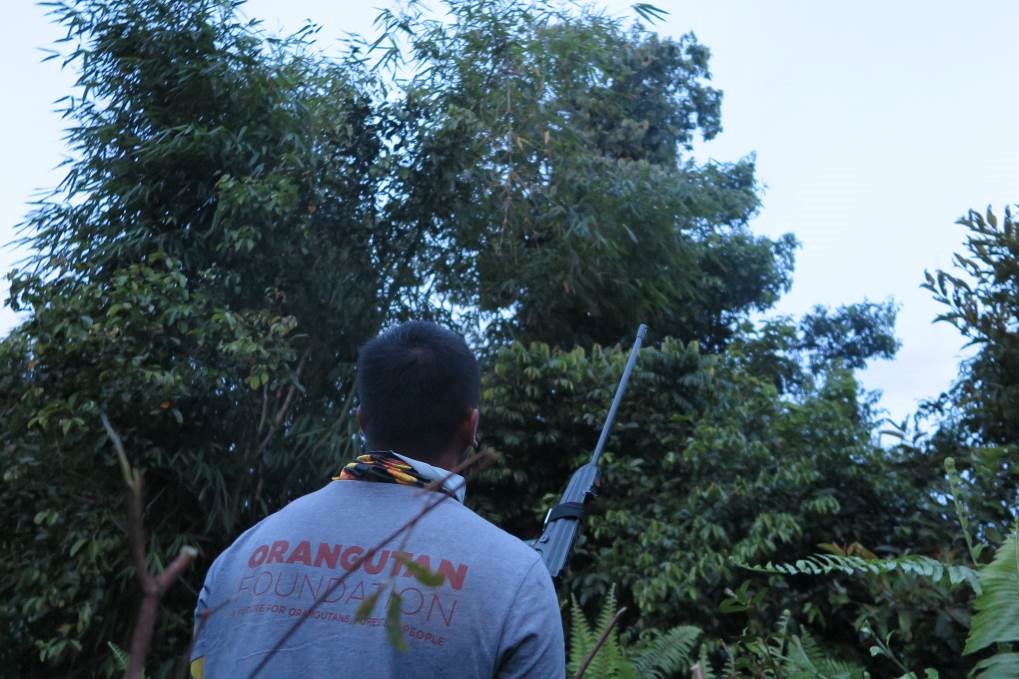
What our staff hadn’t anticipated was that she might just remain where she was and fall asleep, making it very difficult to then rescue her. This is just what happened!
One of our rescue team staff, Mr Nasibah, also an expert tree climber, shinnied up the tree to the nest. With huge effort he managed to lower the unconscious orangutan out of her nest. Our staff on the ground, used netting to catch her, as she fell to the ground.
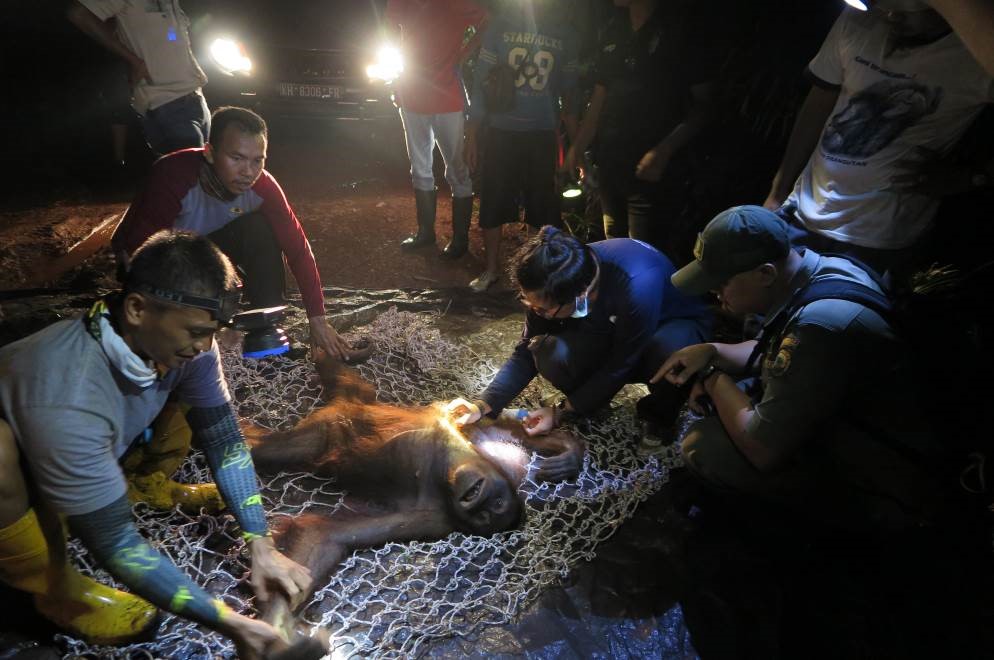
She was quickly transported to an open area where our vet Dr Dimas, examined her. Apart from a small scratch to her chest, she was in full health, weighing 45 kilos and was thought to be around 18 years-old. The scratch was cleaned and injected with long-acting antibiotics to prevent infection.
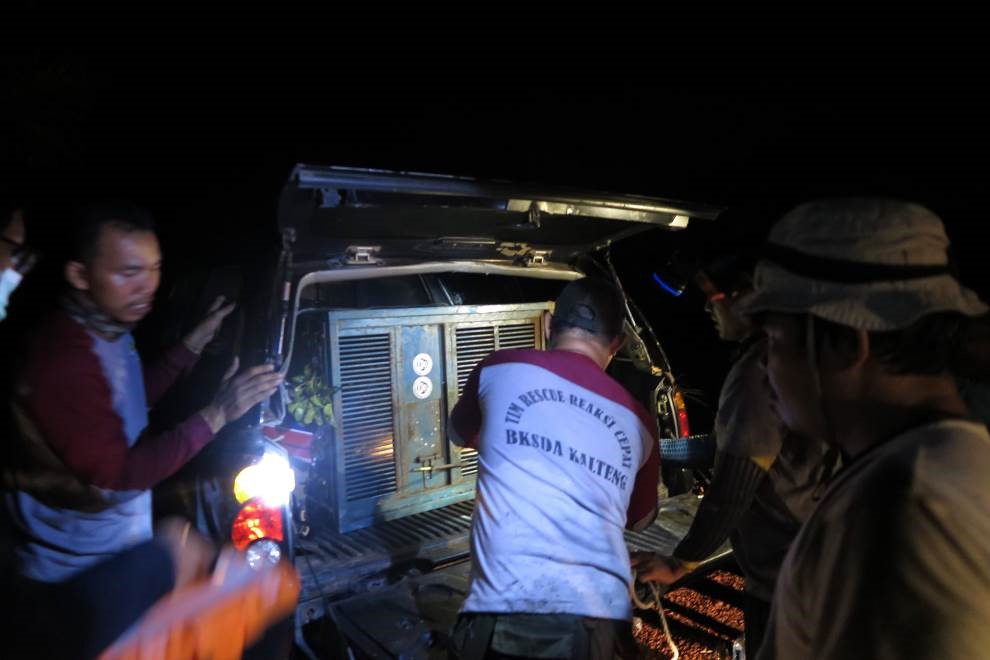
Two days later the orangutan was released in the Lamandau Widlife Reserve, on the opposite side of the river from Camp JL. We protect this forest reserve with guard posts and regular forest patrols to prevent and deter illegal activities.

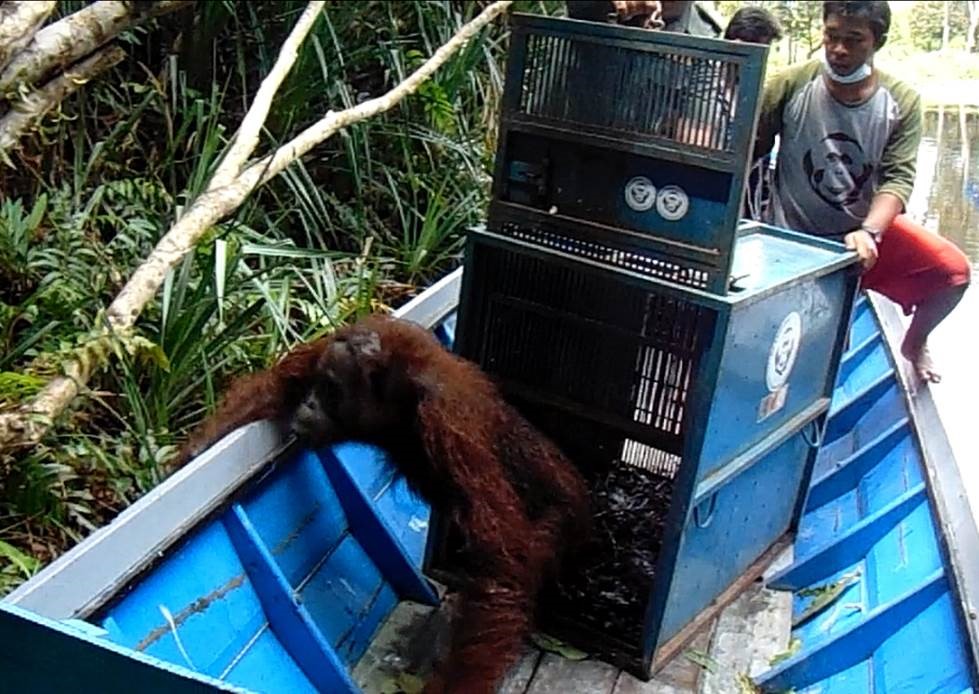
As soon as the transport cage door was opened she actively climbed into the nearby trees and disappeared into the forest.This, we hope, is her last encounter with humans.

The Lamandau Wildlife Reserve totals 158,144 acres of tropical forest and is home to a population of more than 500 orangutans. Half of these were reintroduced or translocated and given a second chance of survival in the wild. We must make sure they are stay safe. Please donate to our urgent appeal – DONATE TODAY
Protecting orangutan habitat
We only send out appeals when there is a real need for help – and right now, we urgently need funds to strengthen the protection of the Lamandau Wildlife Reserve, habitat of the critically endangered orangutan. In January and February, our forest patrol staff detected and tackled fires, deliberately lit to clear land, next to the reserve. They prevented the fires from spreading and saved thousands of acres of peat swamp forest from going up in smoke. In March, we met with the provincial government to push for those responsible for starting the fires, to be held to account.
The Lamandau Wildlife Reserve totals 158,144 acres of tropical forest. The Foundation's staff put themselves at risk as they battled to protect the forests, home to a population of 500 orangutans. Half of these were reintroduced or translocated by the Orangutan Foundation and given a second chance of survival in the wild. We must make sure they are safe.
It costs a quarter of a million pounds a year to protect the reserve and the wildlife. A significant commitment for a small charity, but a relatively small amount considering the invaluable riches and services the forests contain and provide.
The Orangutan Foundation runs and staffs eight guard posts in and around Lamandau to deter and prevent access to the forests. Our staff, all committed local Indonesian conservationists, patrol on foot or by boat. We use conservation drones and GIS to map and document illegal activities.
The map below shows the guard posts (red triangle on blue).
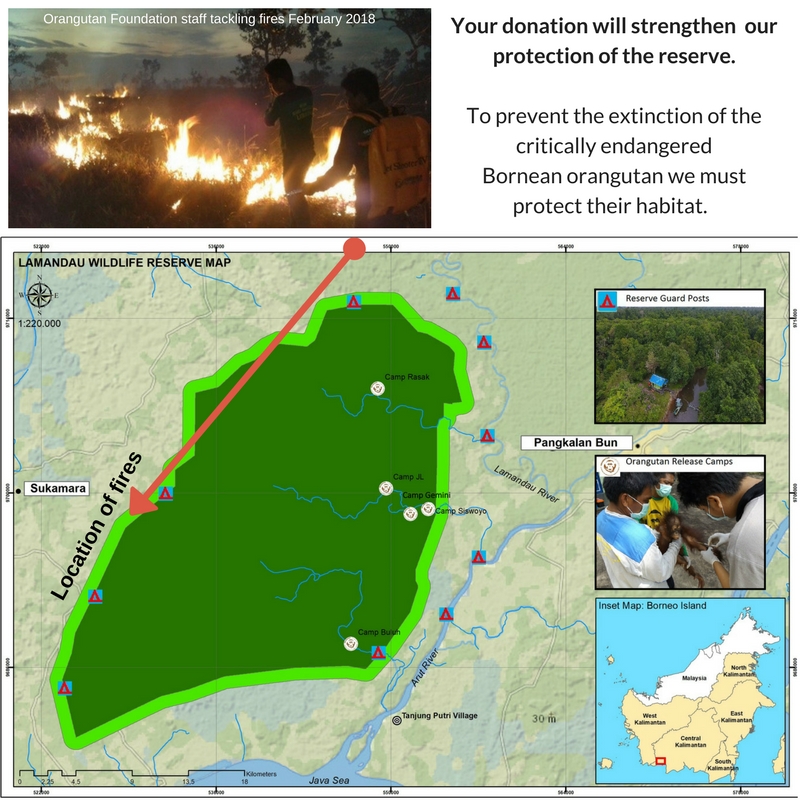
In 2017, we stopped illegal mining inside the reserve and since the beginning of 2018, our forest patrols have detected and stopped two cases of illegal logging.
Yet, despite years of investment in successful community awareness, there remain a small few who want to exploit the forest for their own interests. As pressure for land increases our fight to protect standing forest, to stop it being logged or converted to oil palm, will only become more difficult. Protecting Lamandau is an ongoing commitment: we cannot temporarily close a guard post due to insufficient funds, in the hope that we might start up again next year. If we stop protecting the reserve, we know that we will lose it: the forest and its precious wildlife could be gone in an instant.
Bangkal is one of the orangutans at risk. Originally released into the neighbouring Tanjung Puting National Park, Bangkal was severely injured in 2000 when illegal loggers attacked him with boiling-hot oil. Following a long period of recovery, he was released into Lamandau, at Camp Gemini, one of our five release camps in the reserve. Bangkal, now strong, healthy and independent, has since become the dominant male.Aan, an adult female, was shot and permanently blinded in an oil-palm plantation. Foundation staff moved Aan to the Lamandau Reserve, where she now lives with round-the-clock monitoring by our staff and vet.
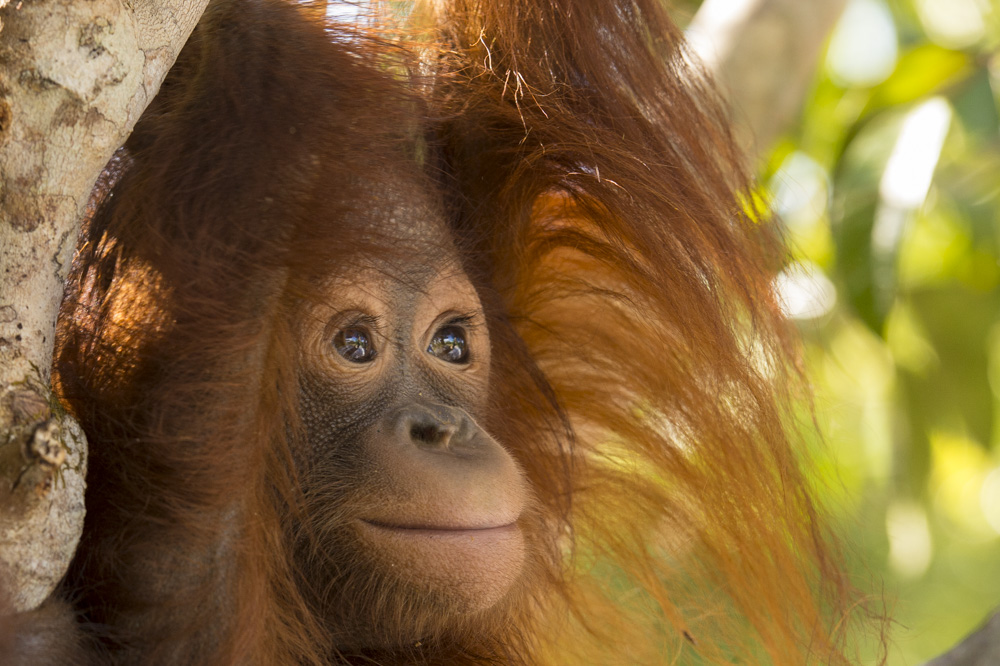
We also care for ten orphaned infant orangutans at our release camps - plus many dozens of reintroduced and translocated adults that are thriving in the wild under our protection. We owe it to these orangutans to keep their forest home safe.
Please DONATE SECURELY THROUGH OUR WEBSITE, by calling 020 7724 2912, or by sending a cheque payable to ‘Orangutan Foundation’ to Orangutan Foundation, 7 Kent Terrace, London, NW1 4RP. If you are unable to donate immediately but want to make funding pledge, whether through fundraising or a delayed donation, please contact us to discuss options – we will work with you however we can.
Sponsor the protection of Lamandau Wildlife Reserve
- £15 protects 10 acres of forest for one year
- £37.50 protects 25 acres of forest for one year
- £75 protects 50 acres of forest for one year
- £150 protects 100 acres of forest for one year
We must act today to secure the future for orangutans, forests and people.
With sincere thanks,
Ashley Leiman OBE
Founder & Director/Trustee
![]()
Volunteer in Borneo with Orangutan Foundation in 2018
We are looking for a few more adventurous individuals to join our volunteer team in Borneo. This year's project is the renovation of a forest guard post in the Lamandau Wildlife Reserve. Volunteers will be working and living on the site, which is a beautiful remote location in the middle of the forest. You will wake up and go to sleep to the sounds of the forest.
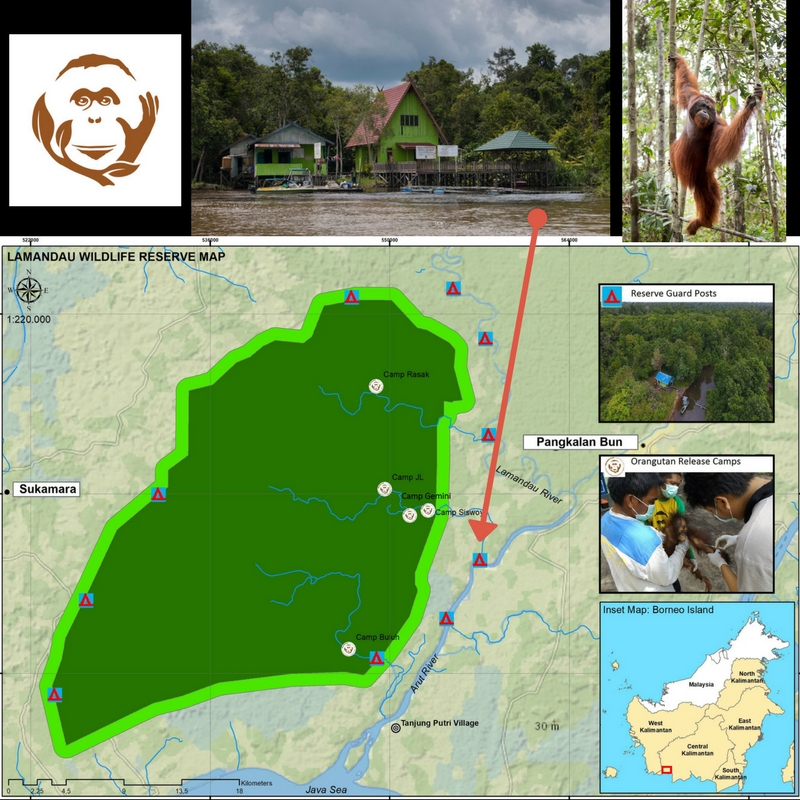
Last November, The Guardian ran an article featuring a first-hand account from one of our volunteer. It is well worth a read if you are interested in volunteering. https://www.theguardian.com/travel/2017/nov/01/borneo-voluntourism-holiday-orangutan-foundation
Orangutan Foundation does not allow any of its volunteers to have direct contact with orangutans and this is for the benefit of the apes. Most people understand this and can see the bigger picture of what they are doing. Watch Orangutan Foundation’s Cathy Smith talking at Compass Ethical Travel Conference about ethical volunteering. https://www.youtube.com/watch?time_continue=213&v=3KM4ZBLvo38
If you want to spend a unique 3 weeks doing something worthwhile for orangutan conservation and see orangutans in the wild, then why not make this the year to join us? To find out more please click here or contact us.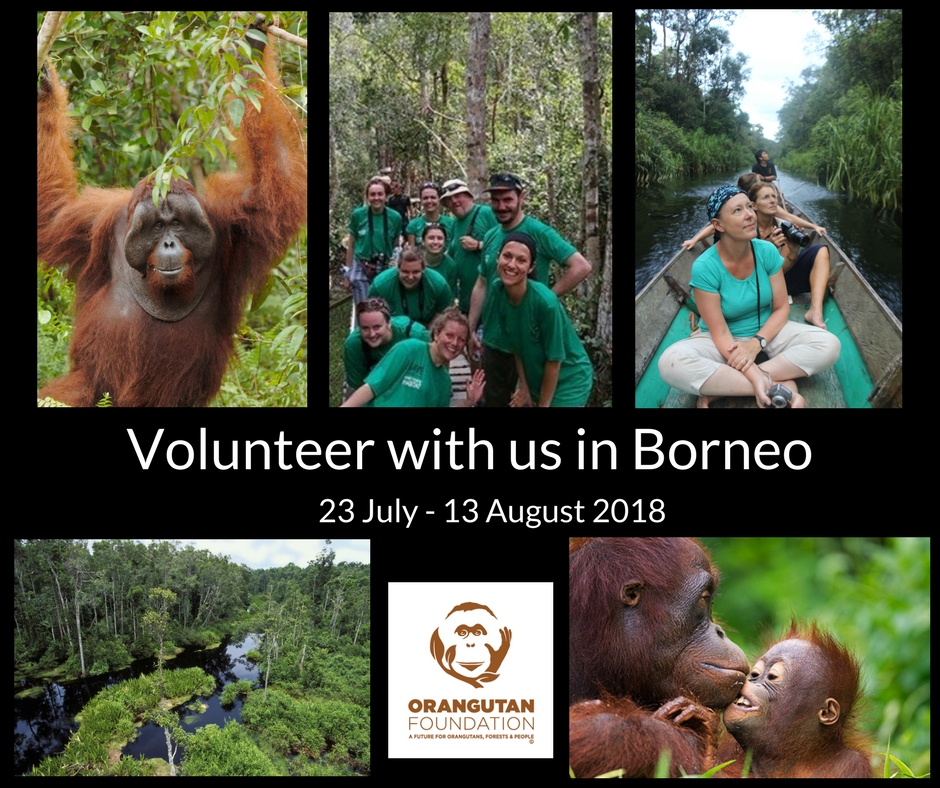
Vet treats orangutans but fires are causing concern
Our Vet, Dr Dimas, has been treating one of the young orangutans in our Soft Release Programme for a dry scalp. Dimas, has been applying a moisturising ointment and our staff will continue with this treatment.
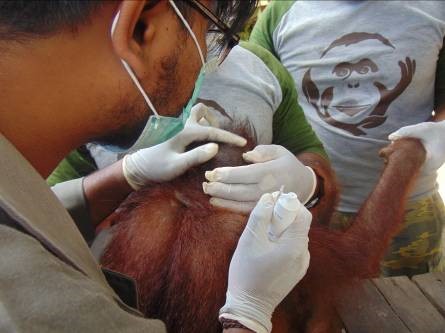
All our young orphaned orangutans were also given vitamins and medication to prevent parasitic worm infections.
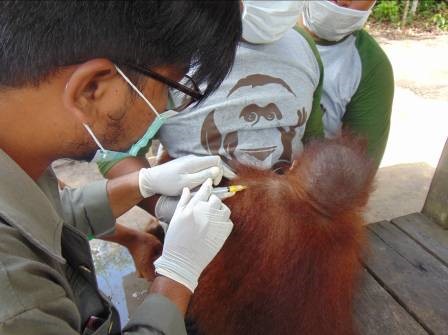
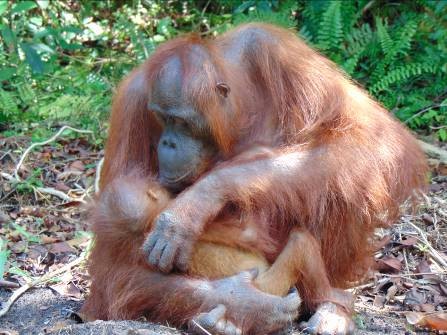
While going from Camp Siswoyo to Camp JL within the Lamandau Wildlife Reserve, Dr Dimas and Azhari (Orangutan Reintroduction Manager) had to use a kelotok boat (flat bottomed) instead of a speedboat because the water level is getting lower. The dry season seems to have come early this year to Central Kalimantan, with very little rain.
There are worrying reports of more fires, right on the boundary of the Reserve. We'll keep you updated on this situation.
Please click here to donate to our work.
Thank you,
Orangutan Foundation
Orphaned infant orangutans "at home" in the forest.
“When Adib, an orphaned infant orangutan, arrived at the end of October he was afraid of climbing in the trees. Within two months he is much more confident and now seems very at home.” said Azhari Purbatrapsila, manager of the Orangutan Foundation’s Release Programme. In this blogpost, Azhari shares his observations of some of the characters in soft-release.
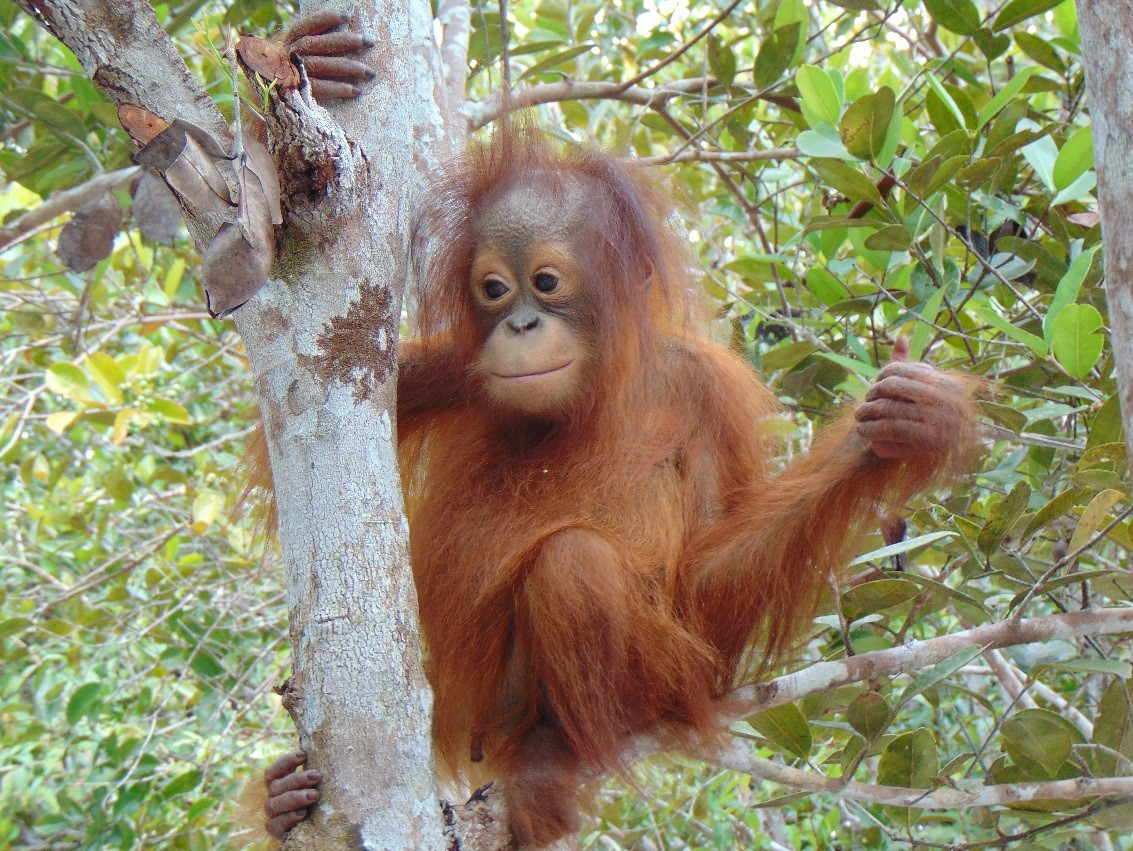
The Orangutan Foundation run 5 release camps within the Lamandau Wildlife Reserve, Indonesian Borneo. Here, infant orphaned orangutans undergo a soft-release process, allowing them time to learn the skills to survive in the wild.
Adib: He can climb high to the tree top. Sometime he plays with orangutans Mona and Timtom but he mainly loves to play alone since the other orangutans are bigger and stronger than him. (Watch Adib's first climb)


Mona: Mona is making great progress. Just after she moved out from her sleeping enclosure, Mona climbed a tree and straight away started bending the branches. She made a tiny nest. Not long after the nest had broken with the branches springing back to their original position. She still doesn’t have enough strength to break the branches and make a firm nest. But still, this is a really good improvement from her!
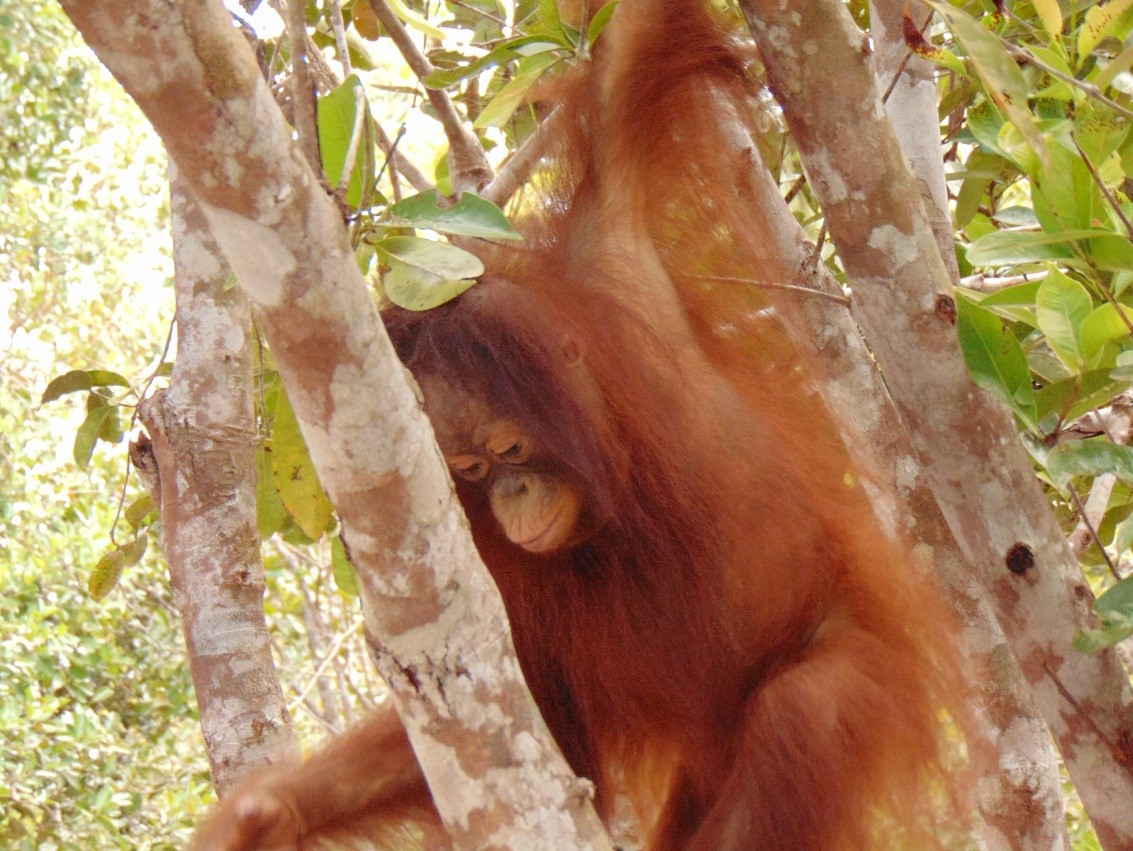
Timtom: Like Adib, Timtom likes to play alone but she will play will Mona or Adib. She plays in the lower tree branches, even though she can climb to the top. Being cautious, she never ventures far.

Boy & Nyunyu: Boy and Nyunyu are two of the biggest and strongest of the orphaned orangutans, which explains why they are best buddies. They are very active and spend almost all their time playing together so much so that it is often difficult to get them back in at night! An encouraging sign though.
Please donate to support our work helping these orangutans return to the wild. Thank you to all our members and supporters for their ongoing support.
An Orangutan Foundation snapshot - 2017
Here is a snapshot of the Orangutan Foundation’s year in the field, thanks to our dedicated Indonesian staff. Most importantly, thank you for your ongoing support. We truly could not do, what we do, without you. January: Miners evicted from the Lamandau Wildlife Reserve and mining equipment confiscated.
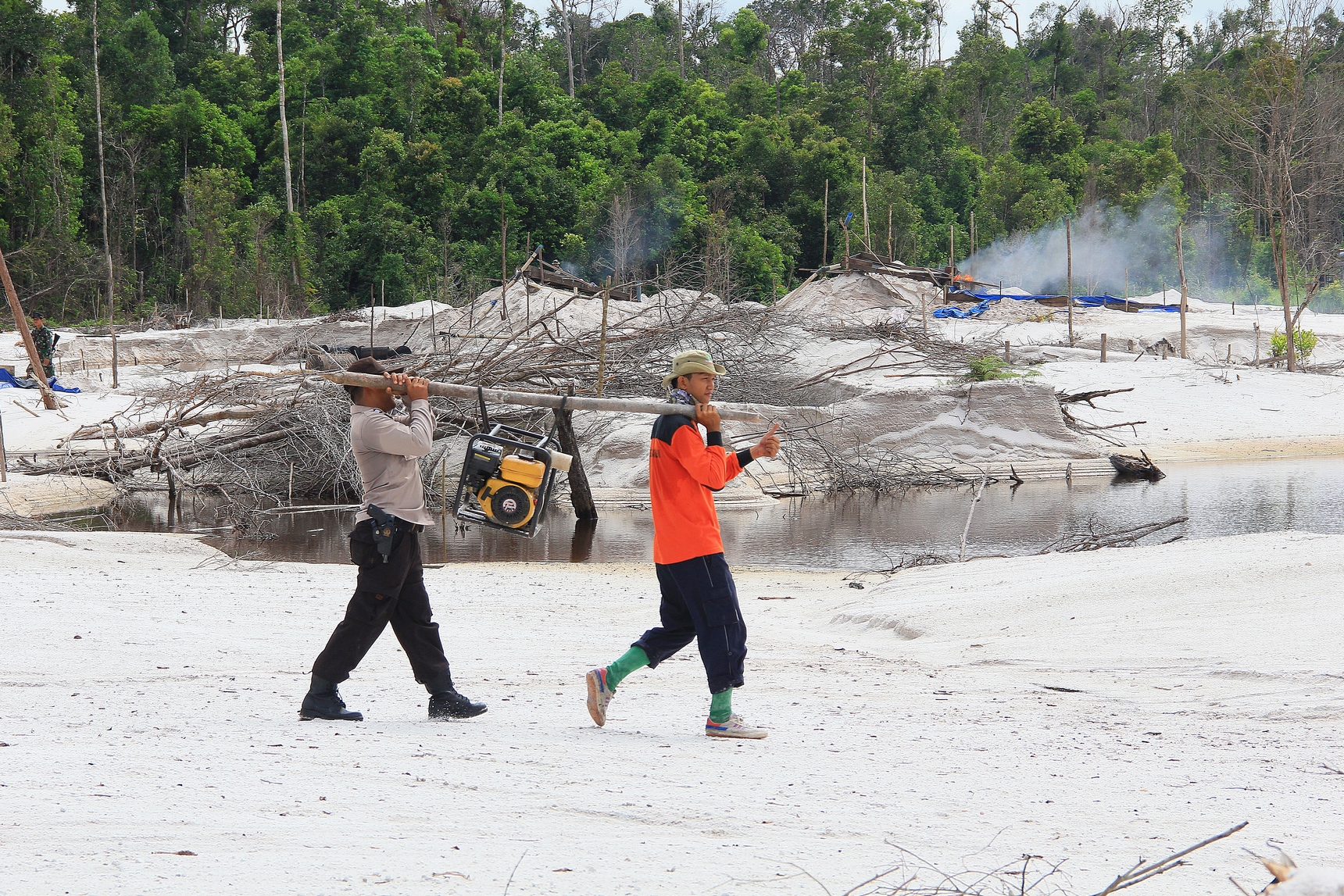
February: Attempts to restore sight to blind orangutan Aan sadly fail but her story galvanises support for her cause. We continue to care for Aan to ensure she has the best quality of life possible.
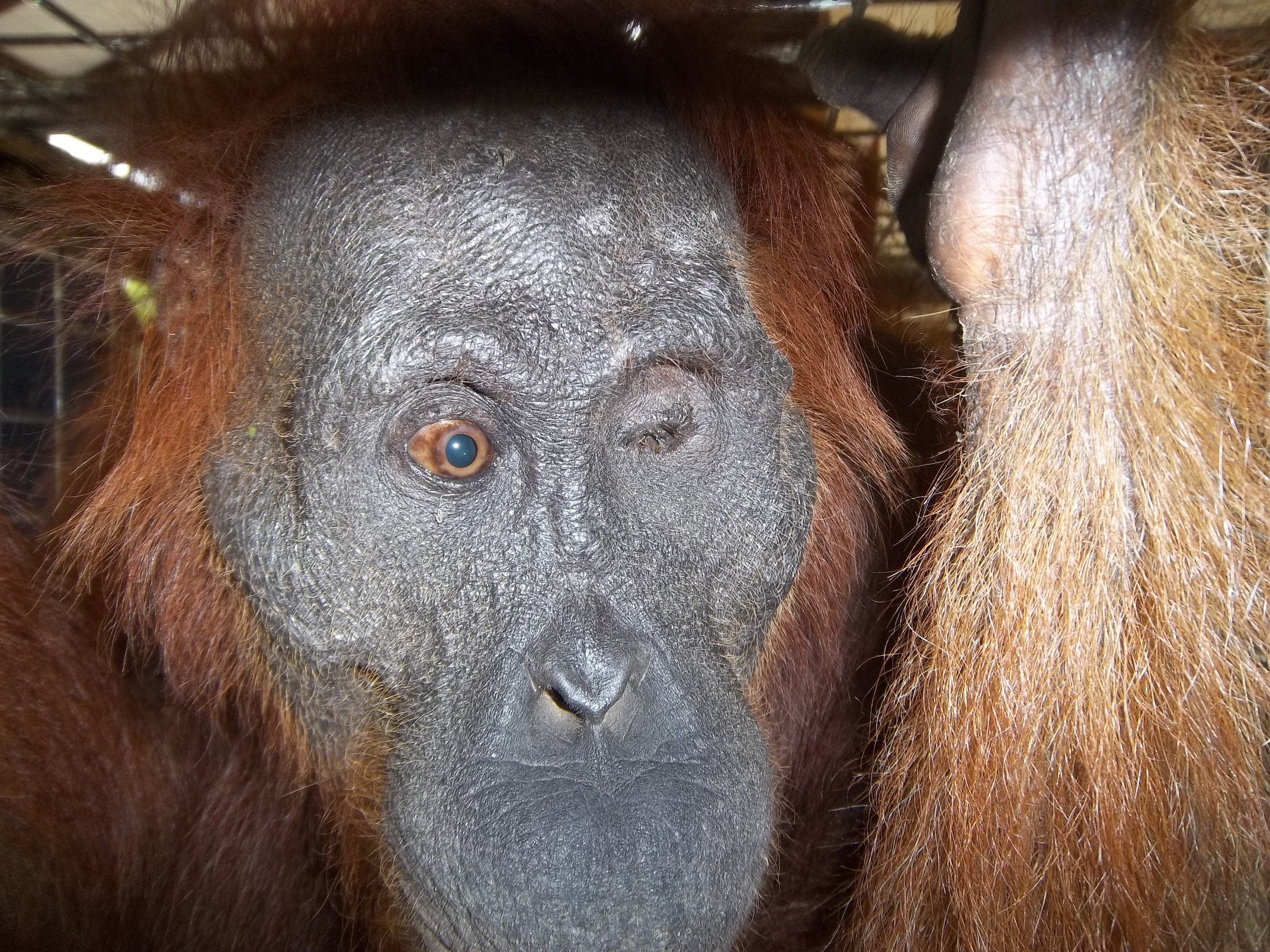
March: Infant orphans, Mona (top) and Nyunyu (below), are rescued and enter our Soft Release Programme, bringing it to 10 young orangutans being cared for.
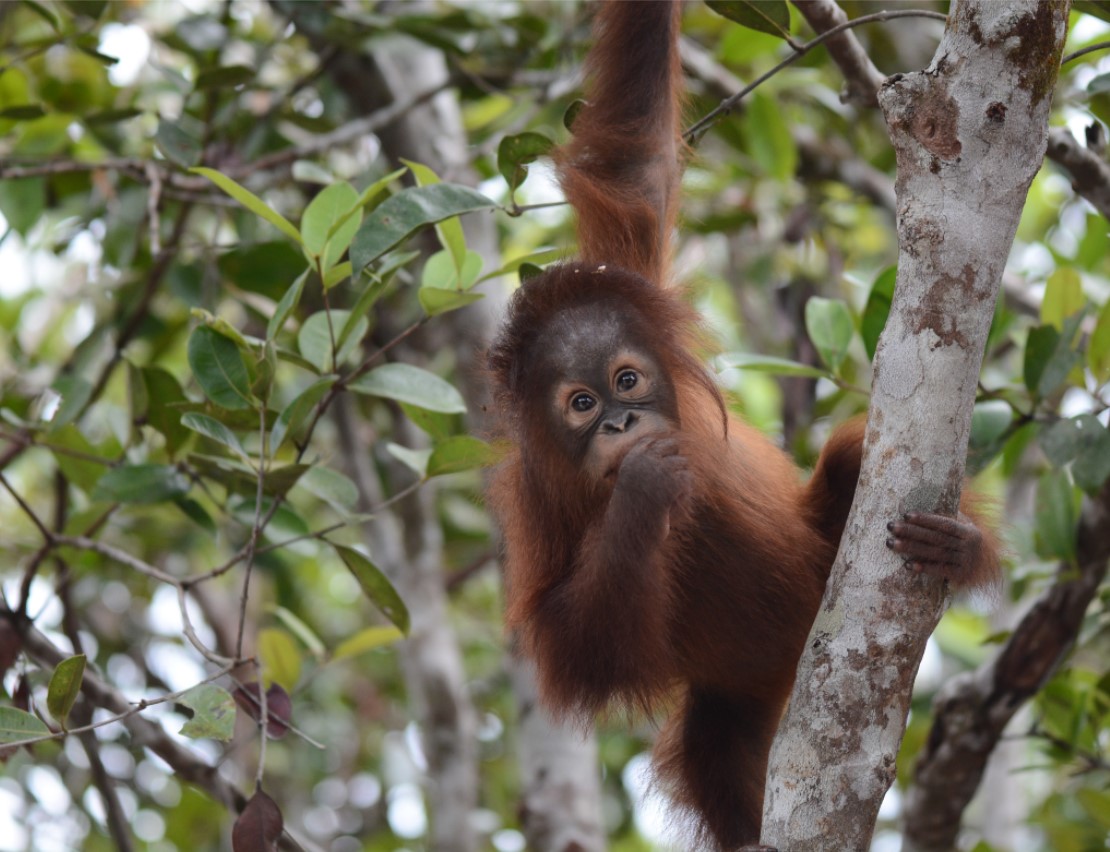
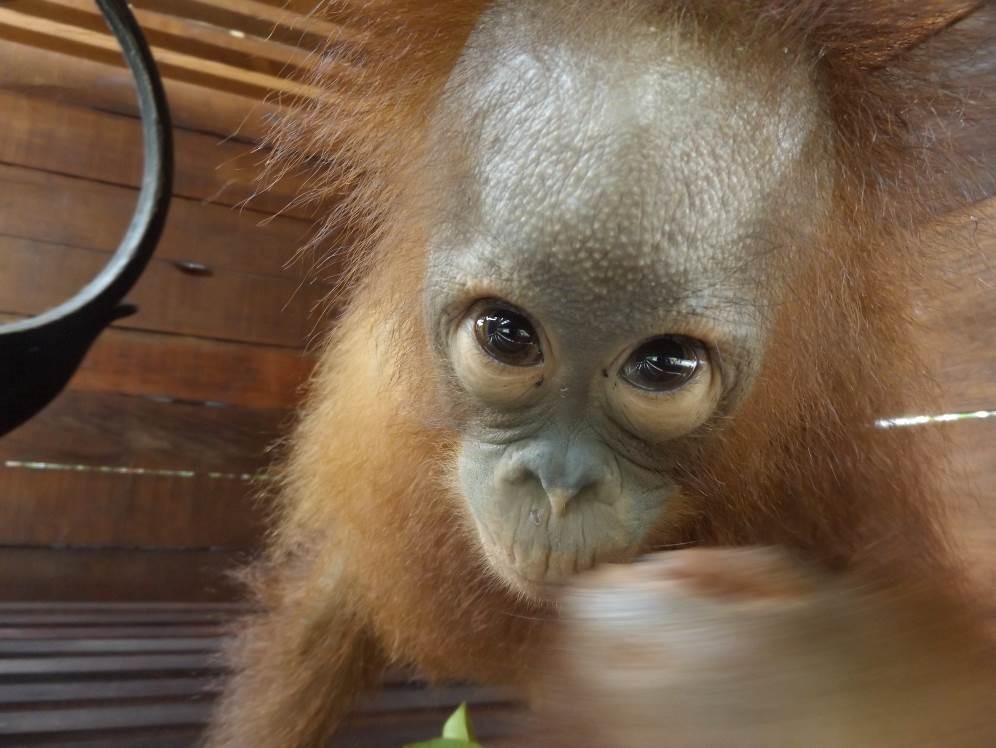
April: Orangutan Foundation, active on Earth Day, involving young Indonesian’s in cleaning up rubbish in their local environment.
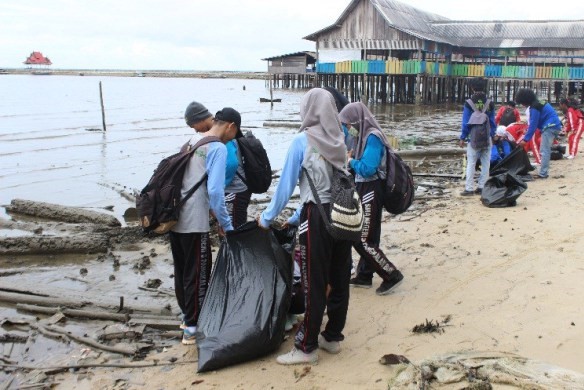
May: Publication of our new photo book promotes the wonders of the orangutan’s world and raises vital funds for forest restoration.
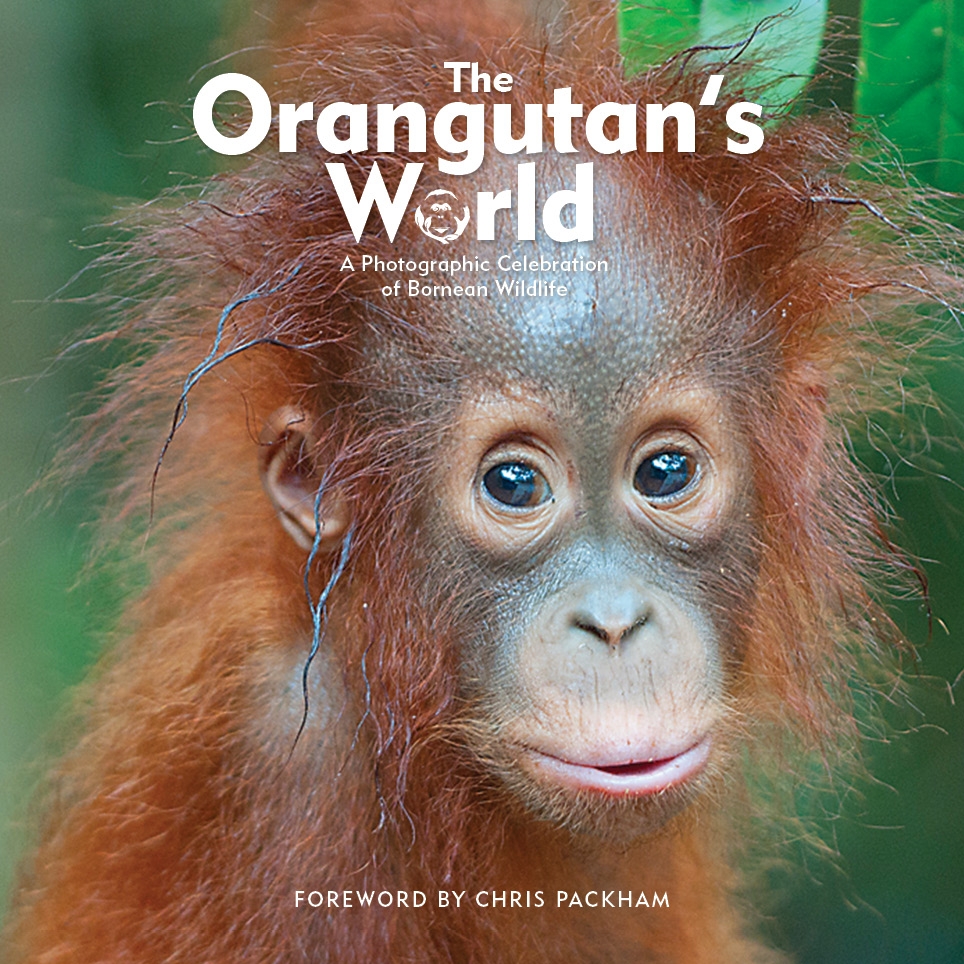
June: A new orangutan birth in Lamandau Wildlife Reserve. Venty shows off her new baby, Volvo.
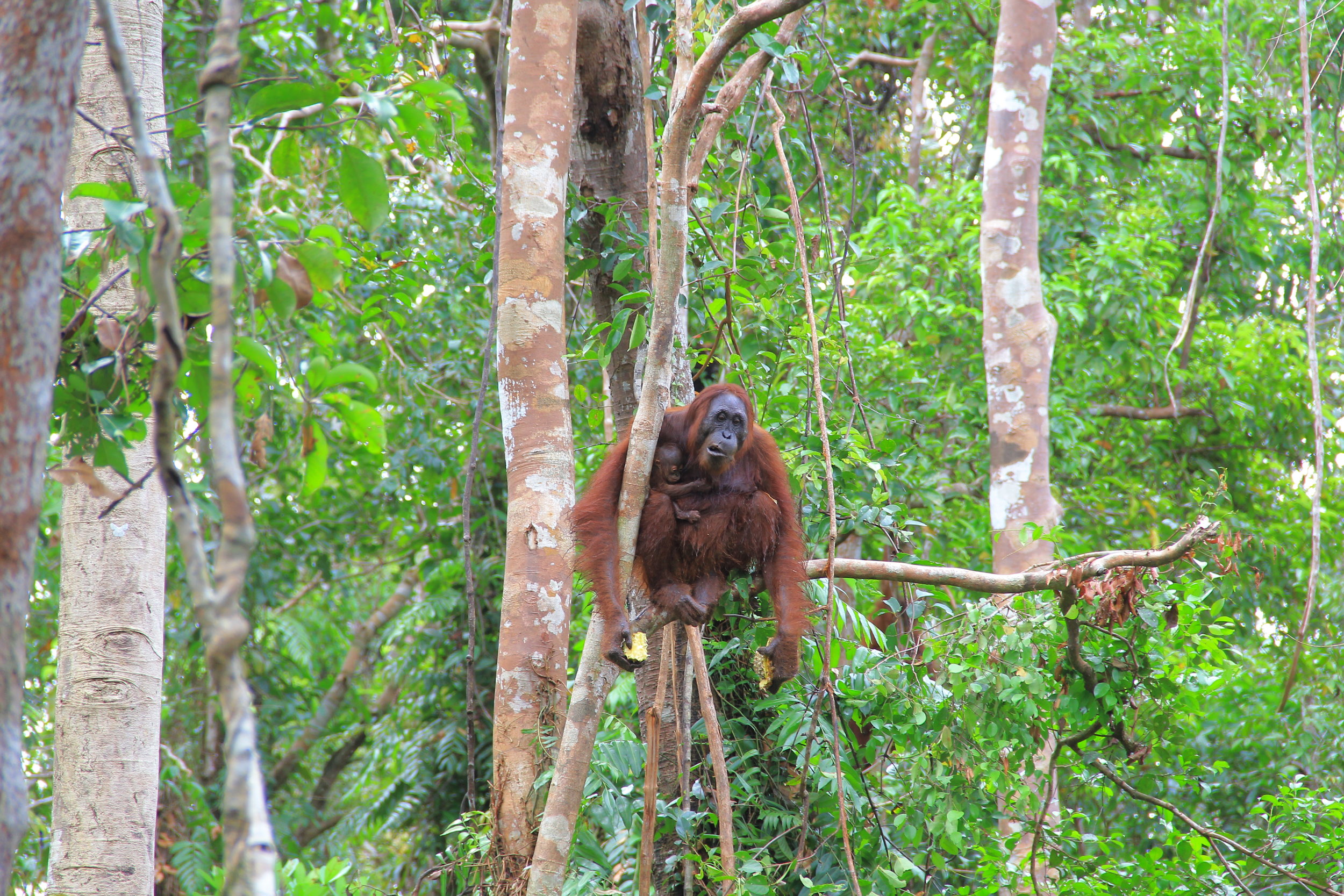
July: Another birth! Dedek gives birth to a healthy baby, named Dublin. Orangutans Jessica and Ketty, are released back to the wild!
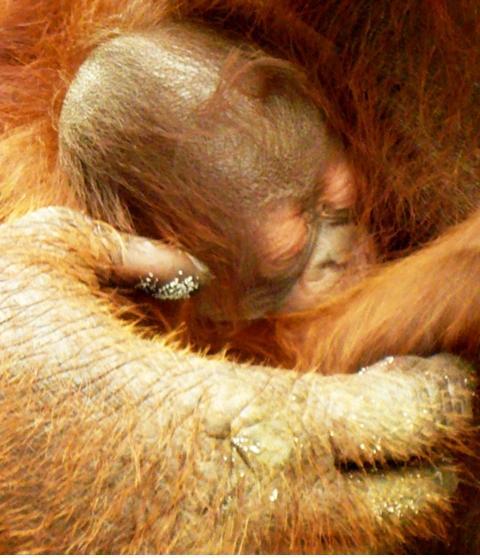
August: Orangutan Foundation staff help tackle fires and stop them spreading to the Lamandau Wildlife Reserve.
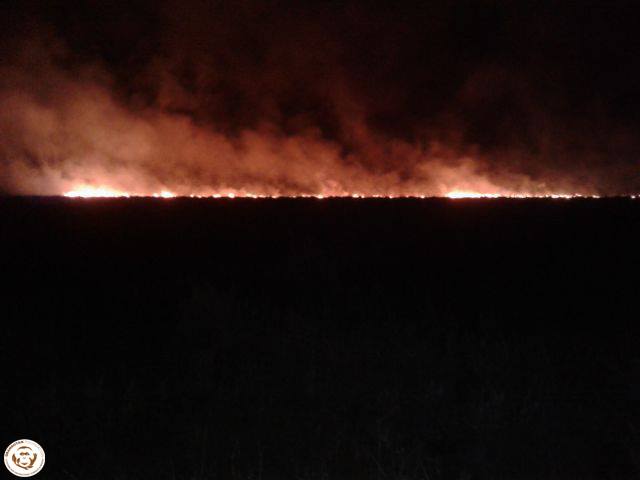
September: Orangutan Foundation Patrols in Tanjung Puting National Park remove and destroy illegal fishing traps, which also pose a threat to other wildlife species.
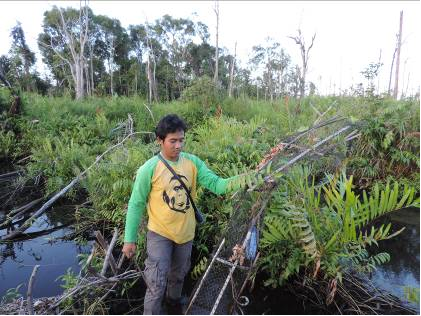
October: Bangkal, an ex-captive rehabilitated orangutan, reminds all who is King of Lamandau!
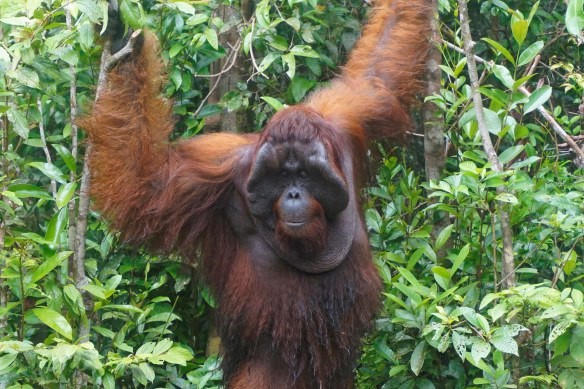
November: 22,000 tree saplings planted out in the Lamandau Wildlife Reserve in 2017
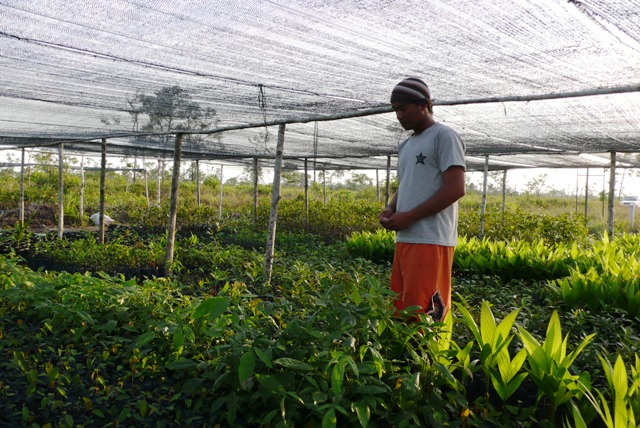
December: A wild female orangutan is rescued from a beach resort and translocated to the safety of the Lamandau Wildlife Reserve.
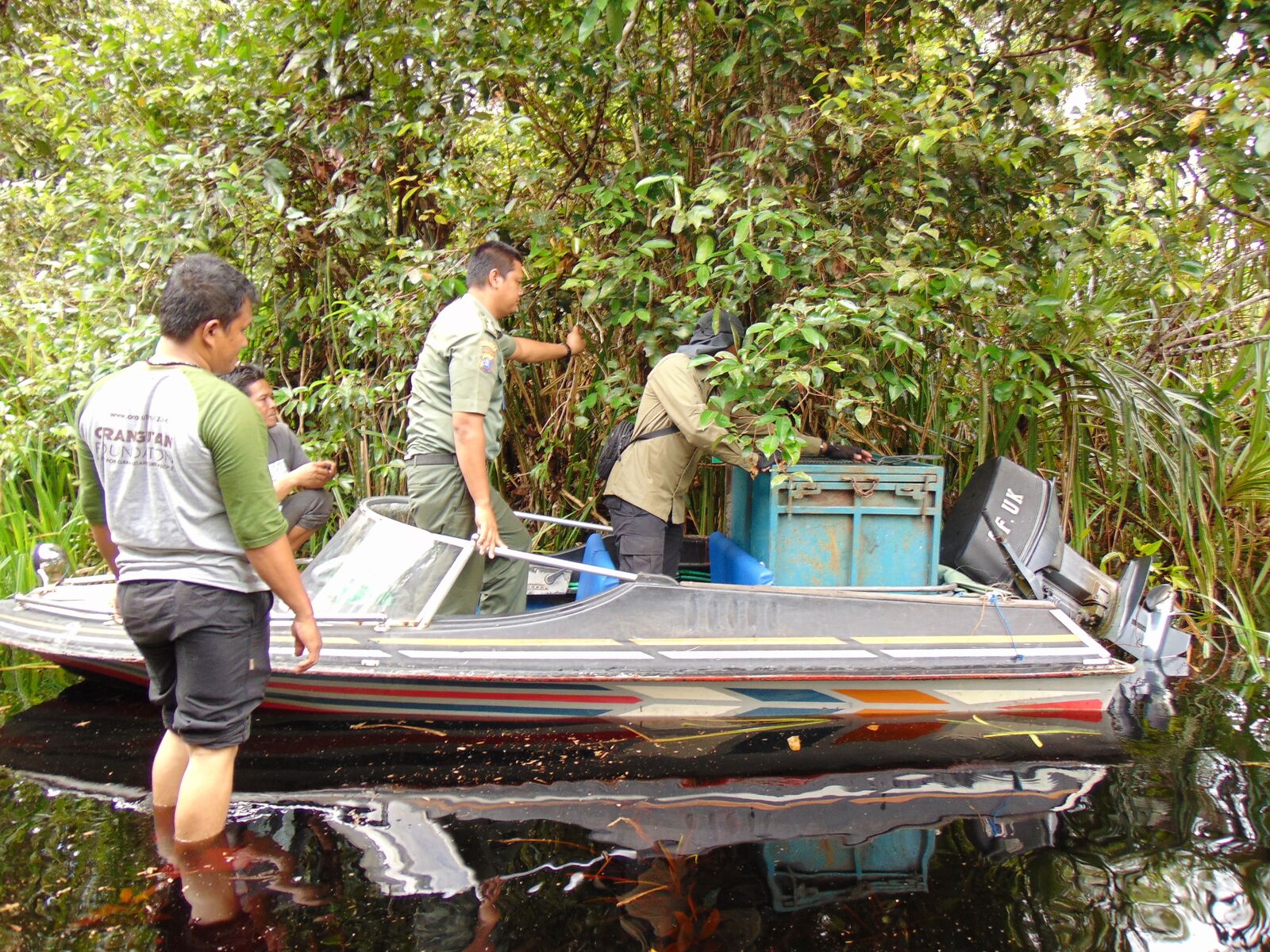
And to finish off our year here's Adib, the latest orphan orangutan to join us in November, making his first climb at Camp JL, in the Lamandau Wildlife Reserve.
DONATE to support our work
"All my days in the field are special, but on occasion something really exciting happens - a fight between two male orangutans and we were able to film it." - Ashley Leiman OBE
No sooner had our speedboat arrived at Camp Buluh when the staff came running and excitedly told us to hurry up. I knew before I reached the end of the jetty by the noise of breaking branches that something was going on in the forest ahead.
It didn’t take me long to see one huge male being pursued by another, both cheek padded. The assistants told me that they were Yoko, who was often seen around Camp Buluh, and Darwin, who hadn’t been seen for a number of years.
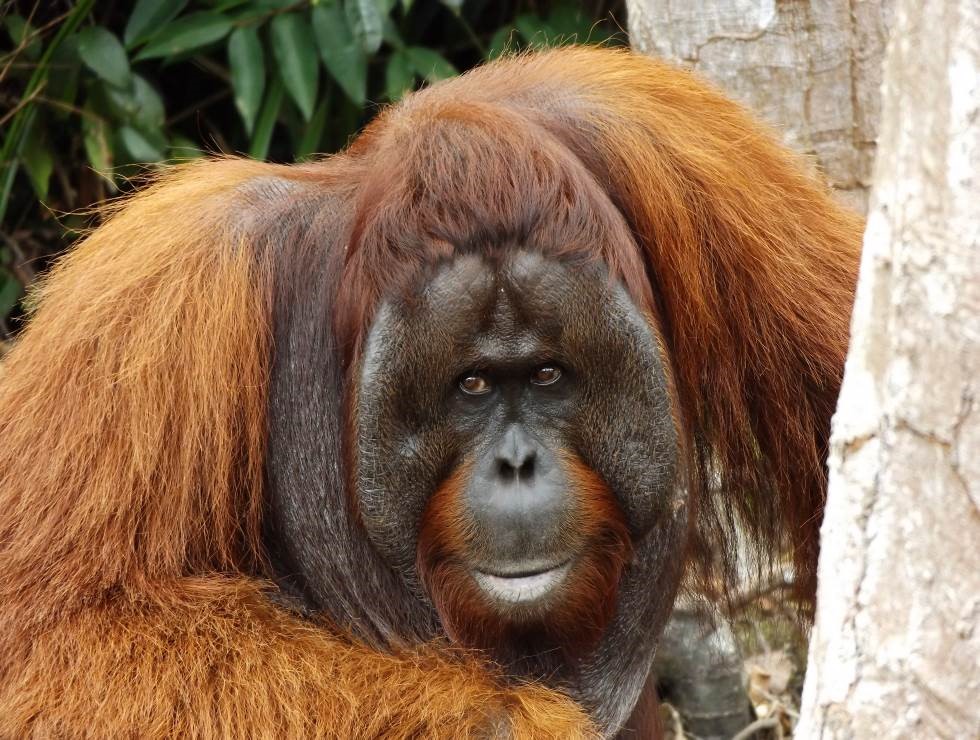
The orangutans were face-to-face in open combat. They would grapple one another, no doubt inflicting some injuries. This would last for a number of minutes until one would go further into the forest and there would be a lull in the confrontation.
There were times when both came down to the ground, one aggressively pursuing the other, before going back up into the trees. What was interesting was that during the conflict they would occasionally stop to rest, so obviously this activity takes a lot of energy.
Long calls and branch cracking perforated the performance. This encounter went on for over two hours before Darwin, realising Yoko had the upper hand, made his way further into the forest and was not followed. That’s what I love being in the field, it’s never boring, it’s not every day one sees such excitement.
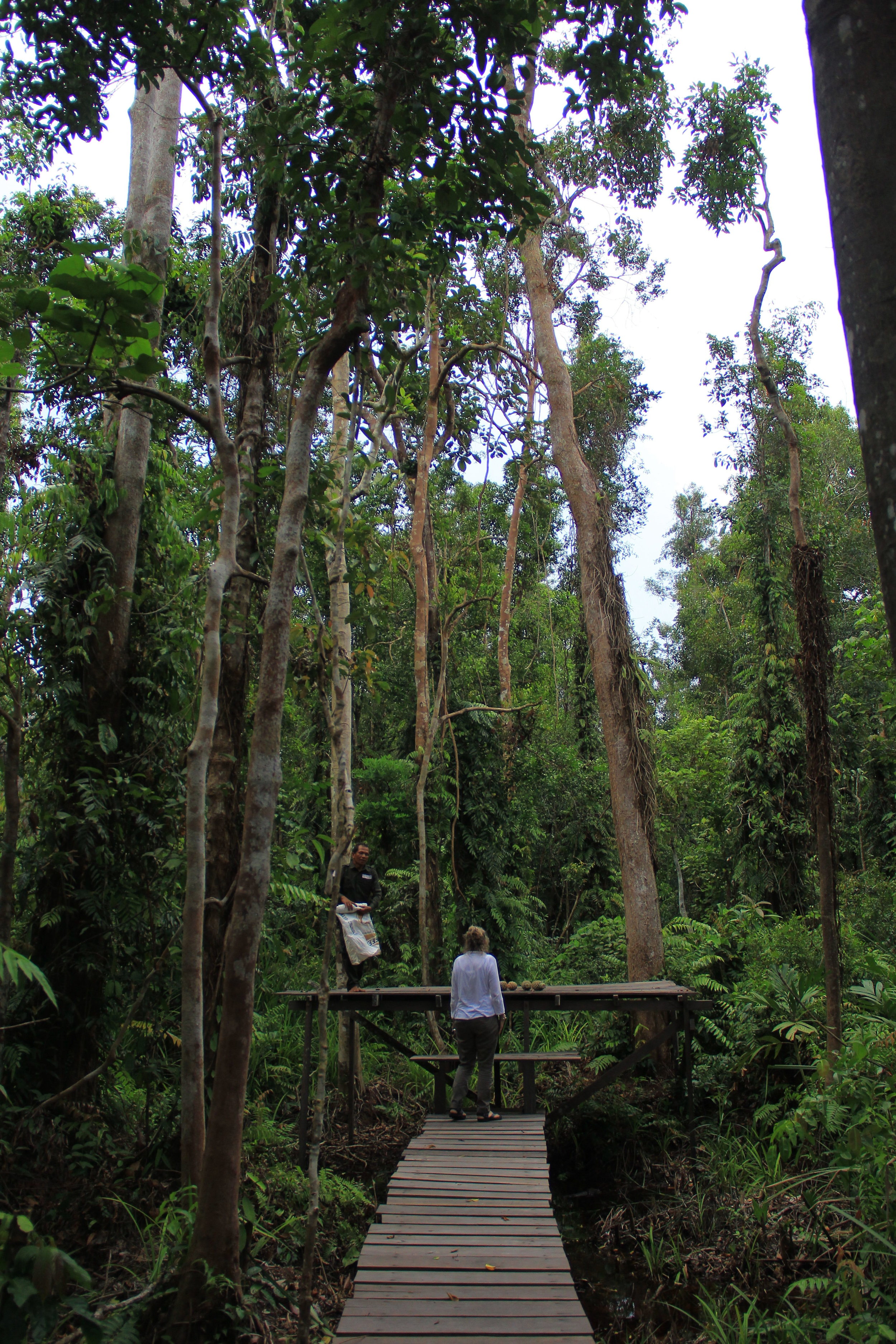

Become a Guardian of Lamandau today and help us protect the home of Yoko, Darwin and over 500 other critically endangered orangutans. Click here to find out more.
Thank you.
Ashley Leiman OBE, Director
Have your donation doubled for free and support Borneo's wildlife conservationists
From 28th November until 5th December you can DOUBLE your donation through the Big Give Christmas Challenge, at no extra cost to yourself. Click here to donate and double your impact to support our work. This year our we are raising funds to inspire Borneo’s future conservationists. In this clip Arie, Research Manager of Pondok Ambung, our tropical forest research station in Tanjung Puting National Park, explains why it is important.
We use camera traps to monitor the wildlife in the forests surrounding Pondok Ambung. Watch this short clip to see some of the species we’ve managed to capture on film!
To protect Indonesia’s biodiversity, future conservationists need to be encouraged and supported.
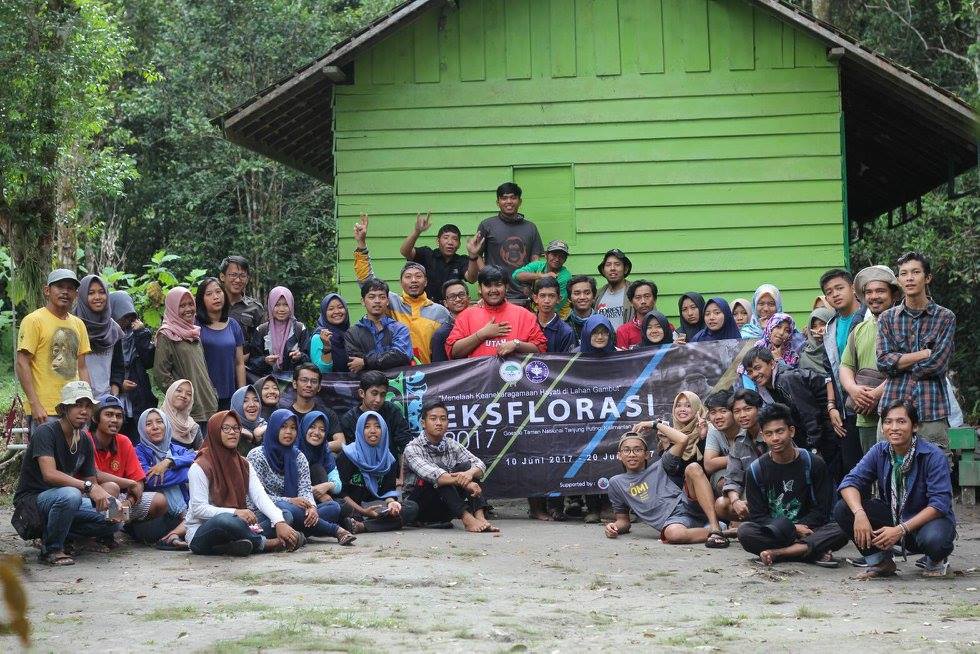
Our research station is a base from where Indonesian students and international scientists can conduct research. Take a virtual tour below:
Please help us to ensure a future for orangutans, forests and people.
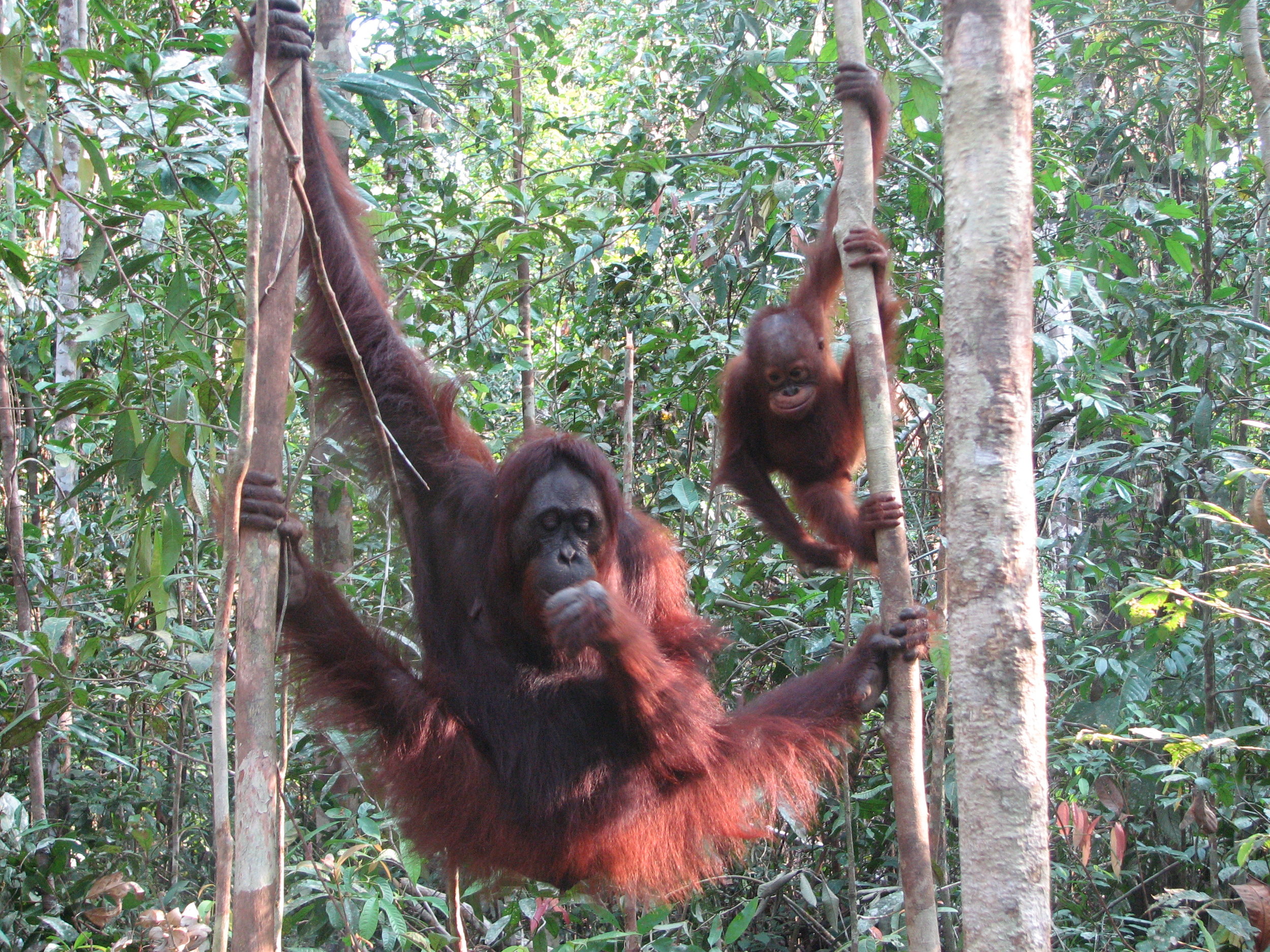
Thank you for your support. Click here to DOUBLE YOUR DONATION through the BIG GIVE.
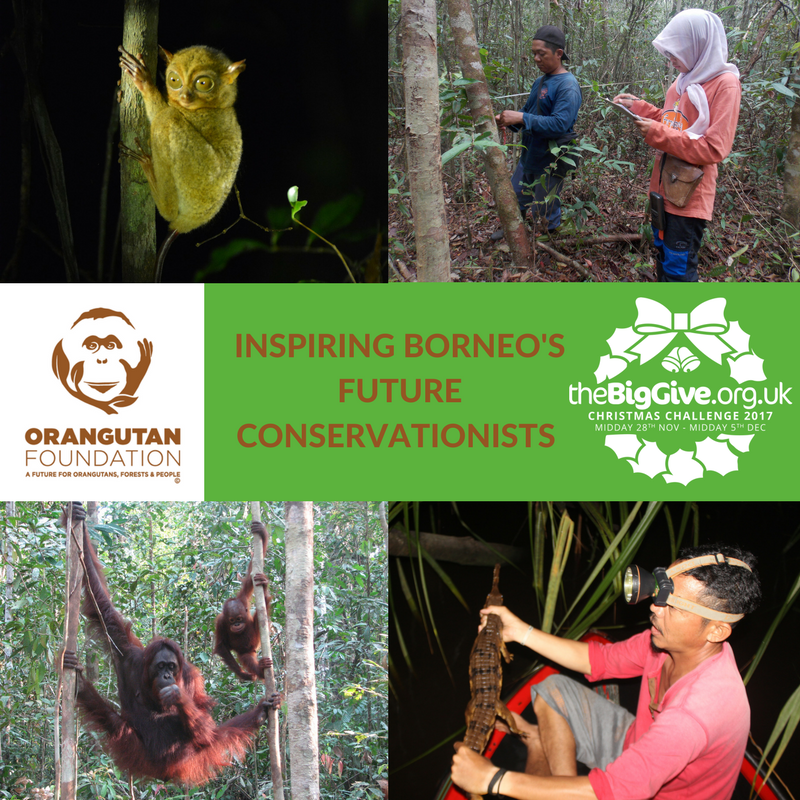
Meet Aan the orangutan
To celebrate Orangutan Awareness Week, we are telling the stories of some of the orangutans who have been given a second chance thanks to your support for our work, but unfortunately, not all have a second chance in the wild. Aan
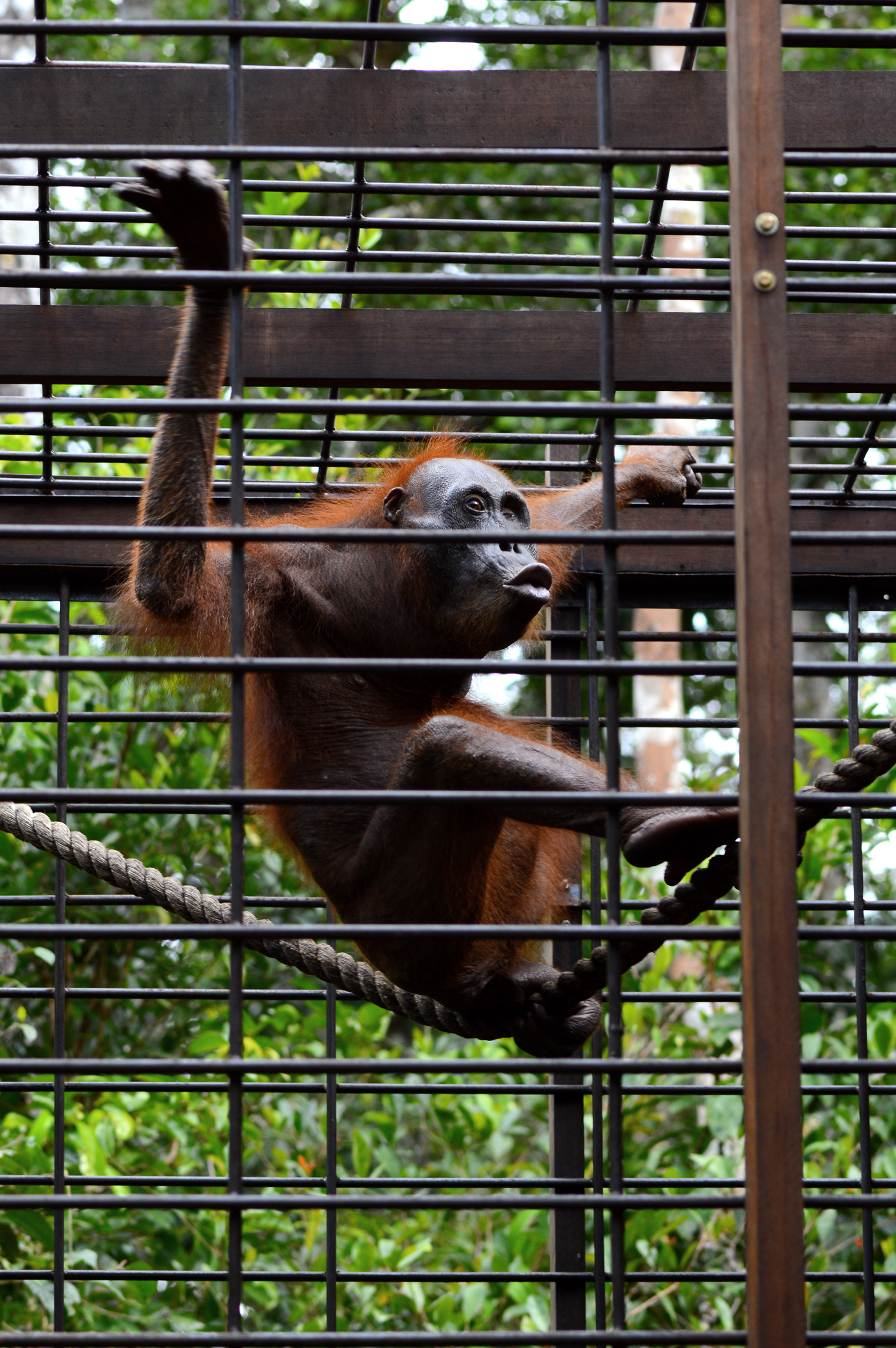
Aan is a blind orangutan. She first came to us in 2012, having been found stranded on an oil-palm plantation, after being shot over 100 times with an air gun. The injuries sustained left Aan blind. You can read more about her rescue here.
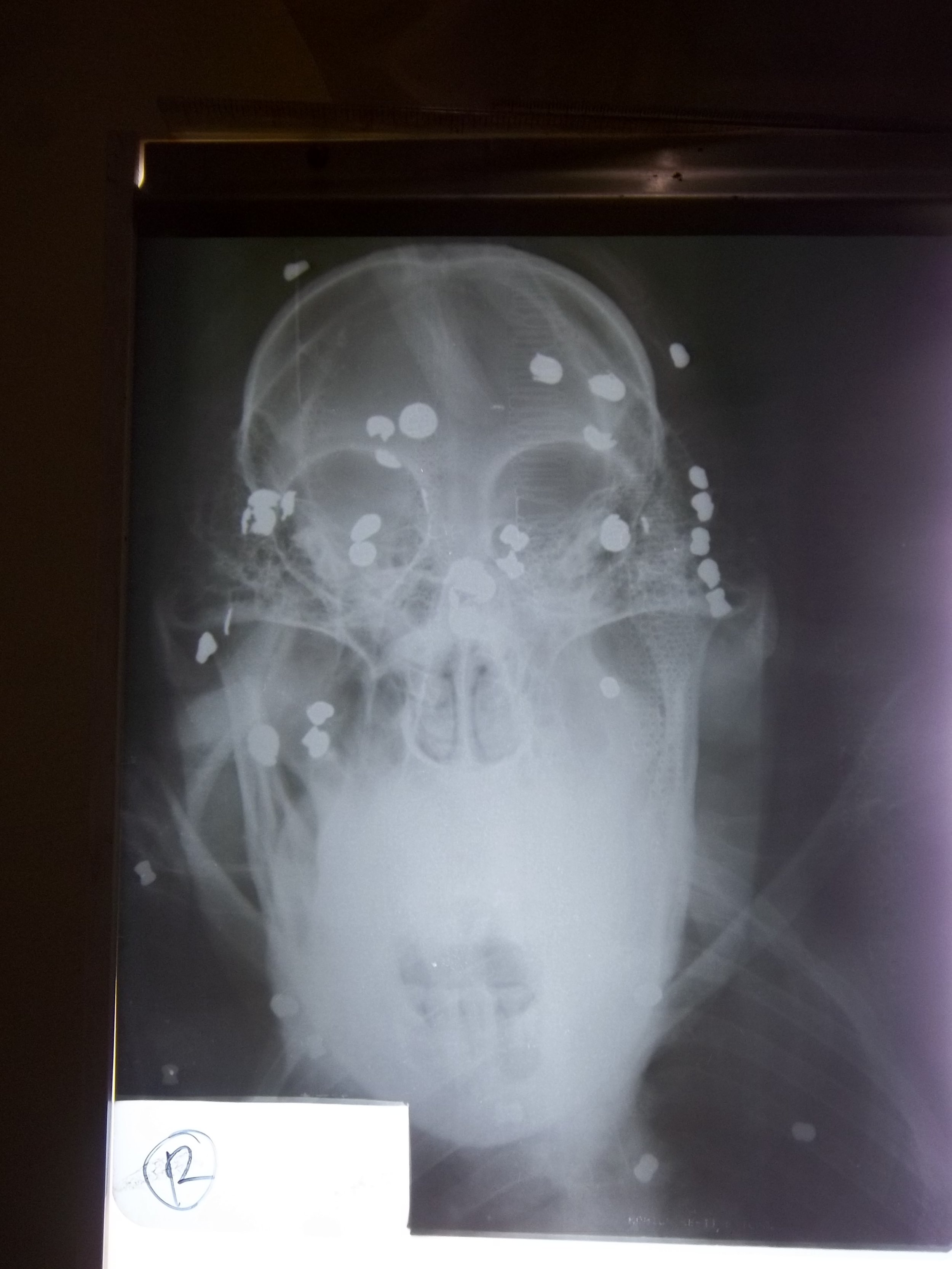
In 2016, we arranged for an ophthalmic surgeon to visit Aan to see if there was any chance of restoring her sight, with the hope that one day she could return to the wild. Aan underwent surgery but it soon became clear that the damage sustained was too severe and Aan would be permanantly blind.

Aan lives in a purpose-built enclosure at Camp Gemini, where our vet clinic is located, in the Lamandau Wildlife Reserve. Our staff give her the best quality of life that is possible, but sadly Aan can never return to the forest, where she belongs.
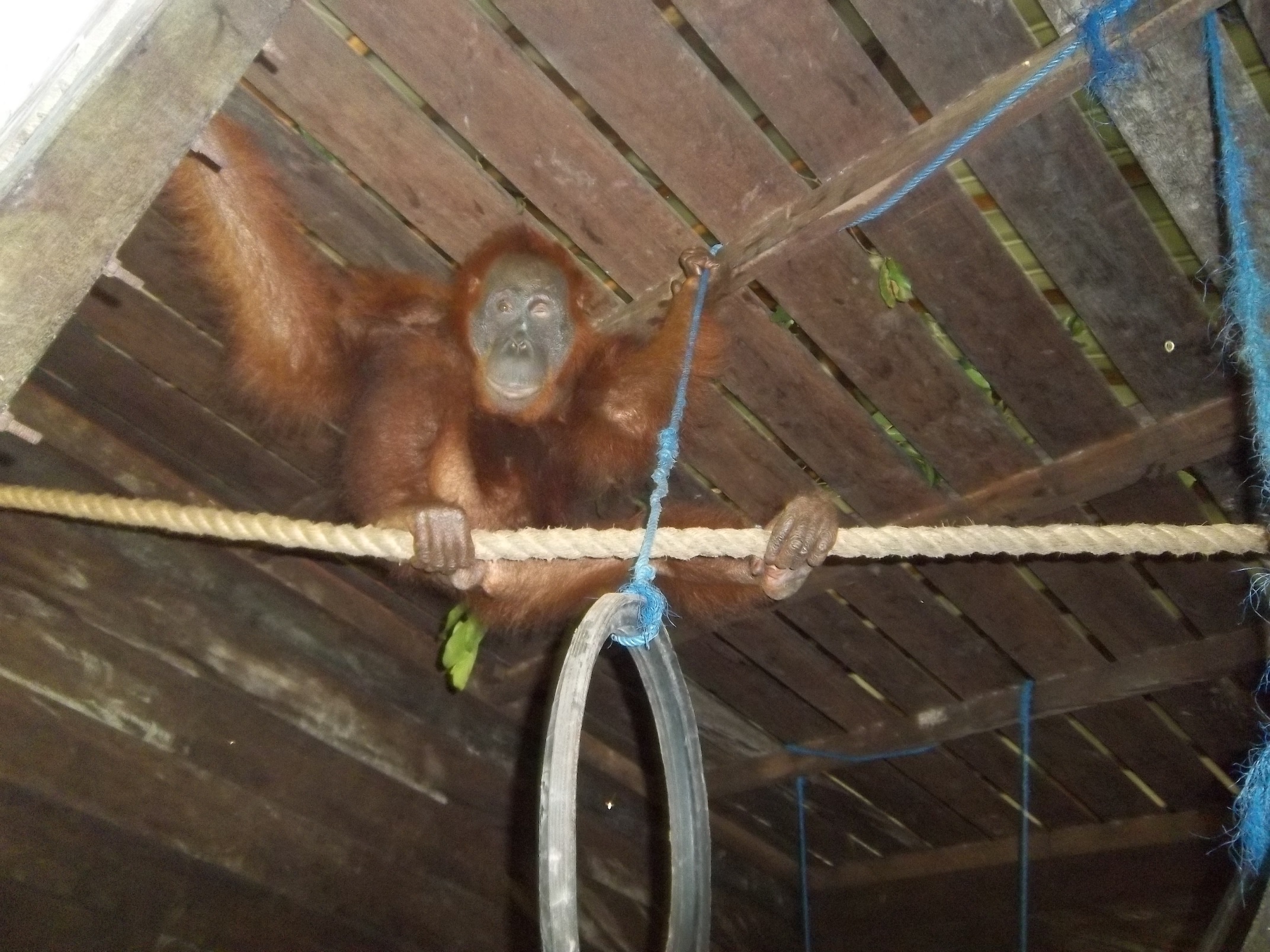
Aan’s story serves as a heartbreaking reminder that the threat to orangutans caused by habitat loss is a very real one. Please support our care of Aan during Orangutan Awareness Week by donating here.
Meet Kotim the orangutan
It is Orangutan Awareness Week and each day we will bring you a story about the orangutans in the Lamandau Wildlife Reserve. Thanks to your support we are protecting their forest home the Lamandau Wildlife Reserve and keeping them wild and free. Kotim
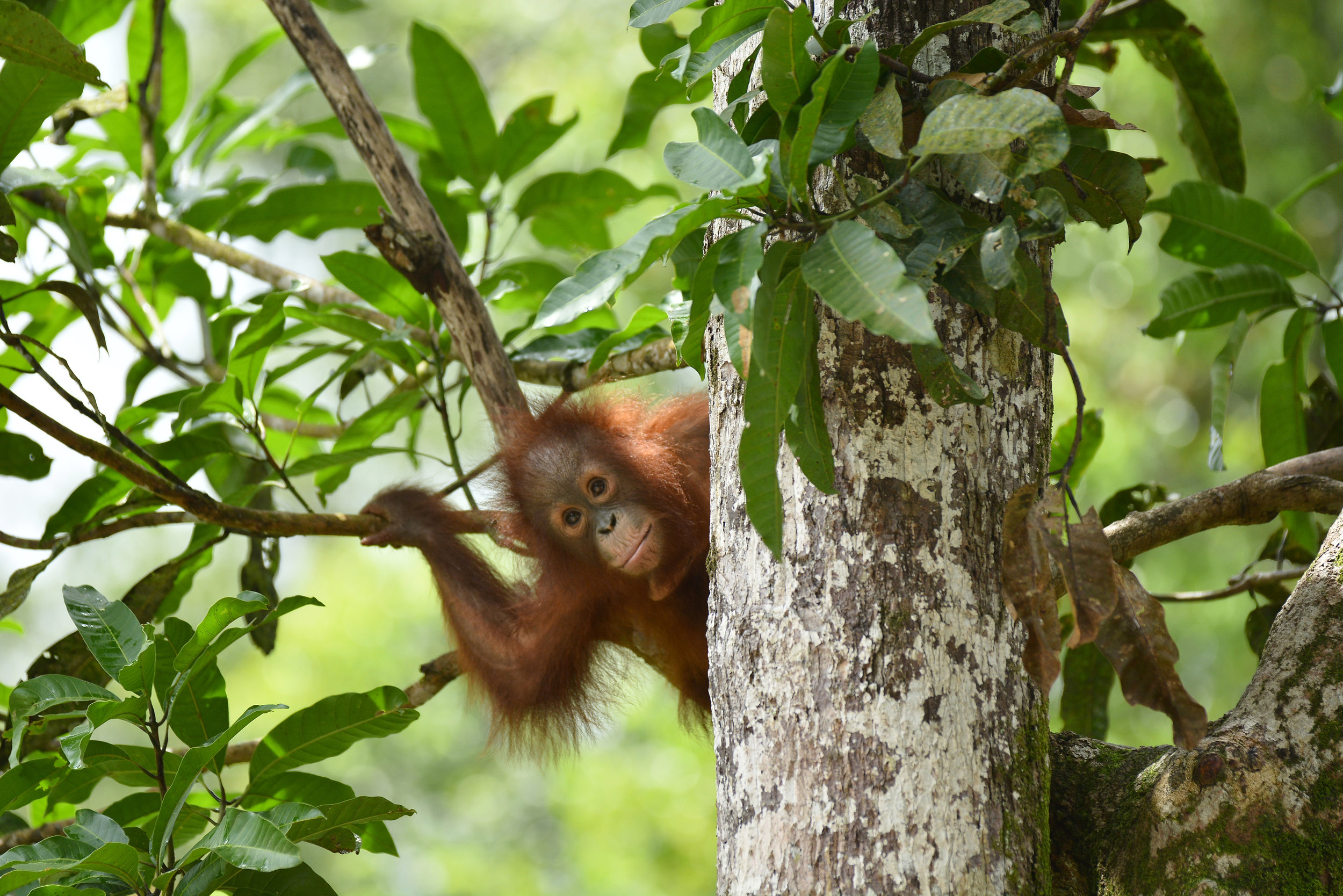
Kotim was rescued in 2014. She was handed over to Orangutan Foundation after being illegally kept as pet. Sadly, we can only assume that her mother was killed.
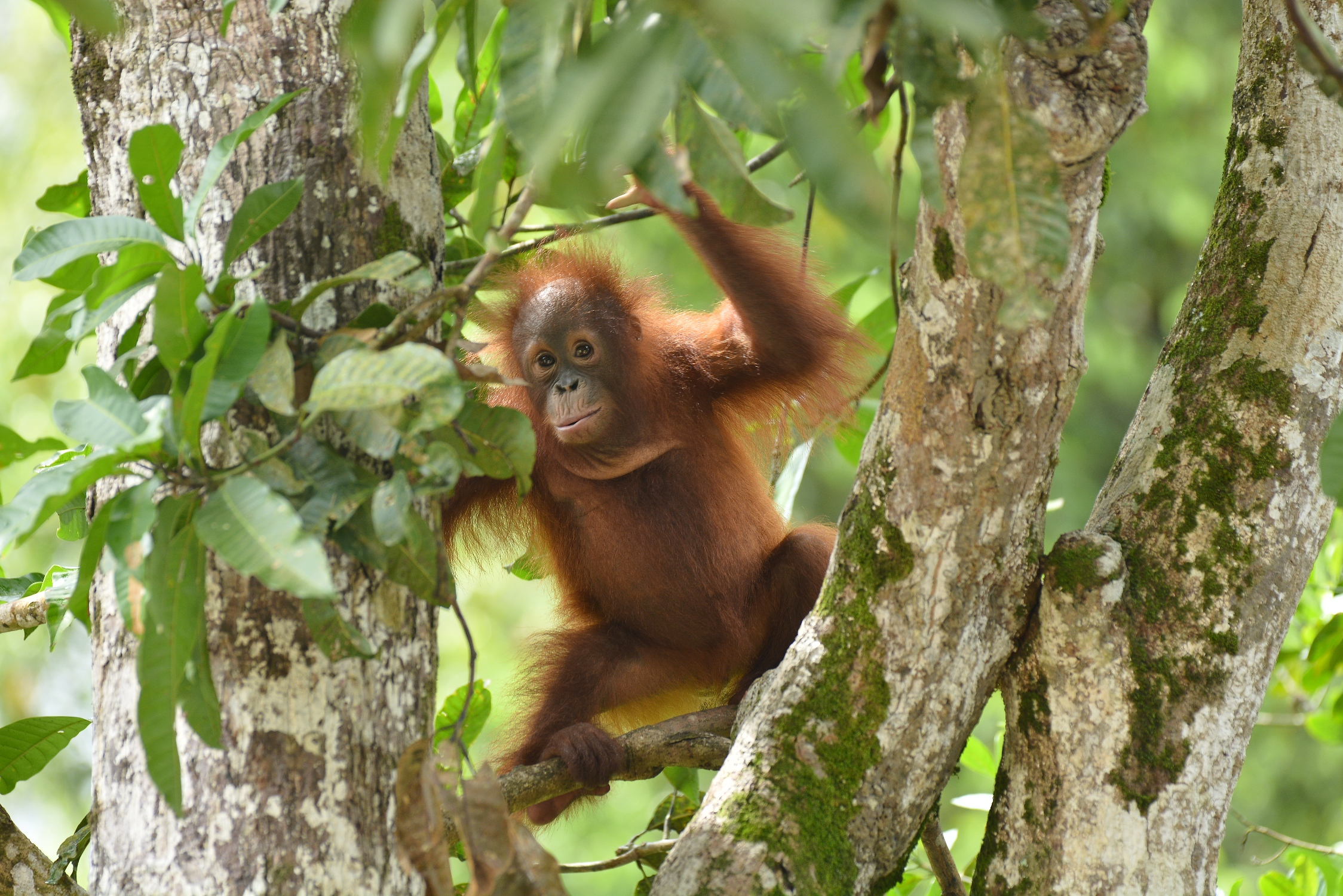
At three-years-old Kotim was too young to be released back into the wild and so entered into the care of our Soft-Release Programme, at Camp Rasak in the Lamandau Wildlife Reserve, Indonesian Borneo. Kotim joined another infant orphan, Torup. They became playmates and together practised their nest-building and climbing skills.
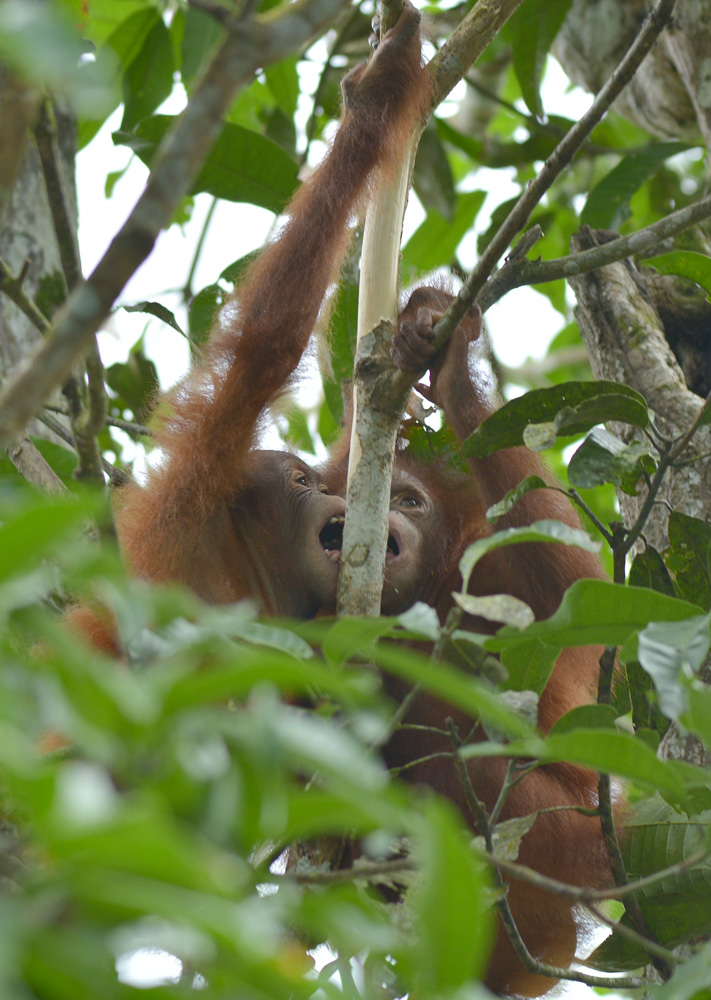
By April 2016, Kotim was deemed to have all the skills needed to survive in the forest and was successfully released. She is still occasionally seen by Orangutan Foundation staff. In December 2016, Kotim was seen with adult female orangutan Acuy and her infant, Ariel.
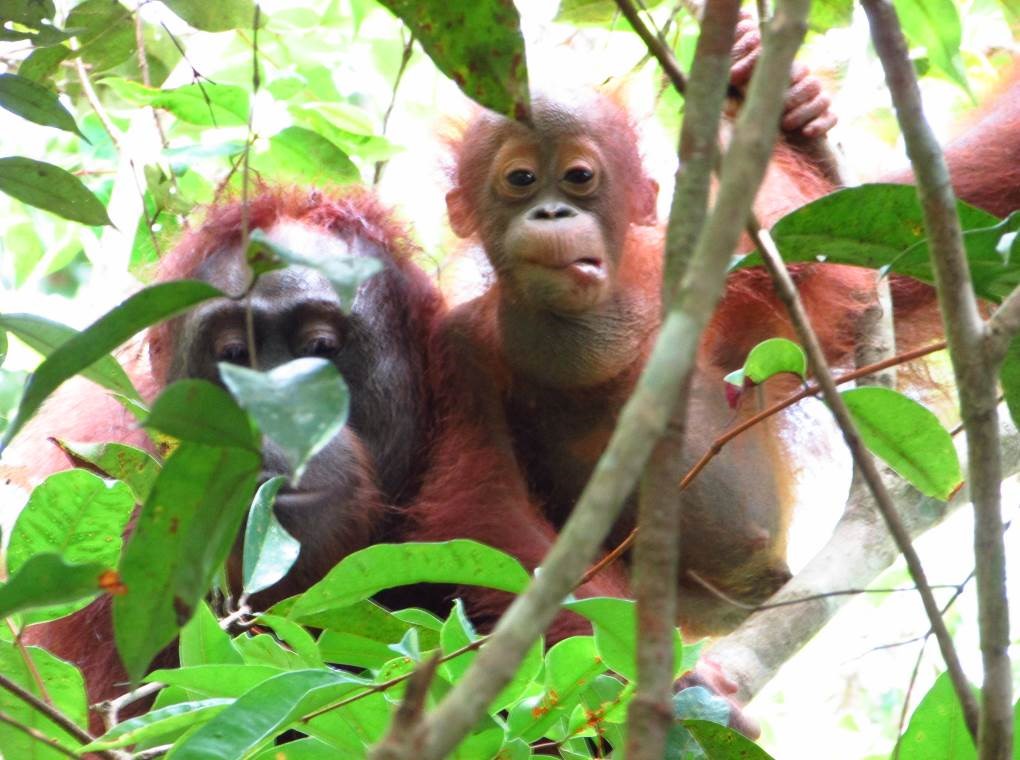
Support Kotim during Orangutan Awareness Week. Please donate to help us protect her tropical forest home. Keep forests standing and orangutans in the wild.
Please donate here.
Here's a video of Kotim whilst under our care in our Soft-Release Programme:
Meet Bangkal the orangutan
To celebrate Orangutan Awareness Week, we are telling the stories of some of the orangutans who have been given a second chance thanks to your support for our work. Bangkal
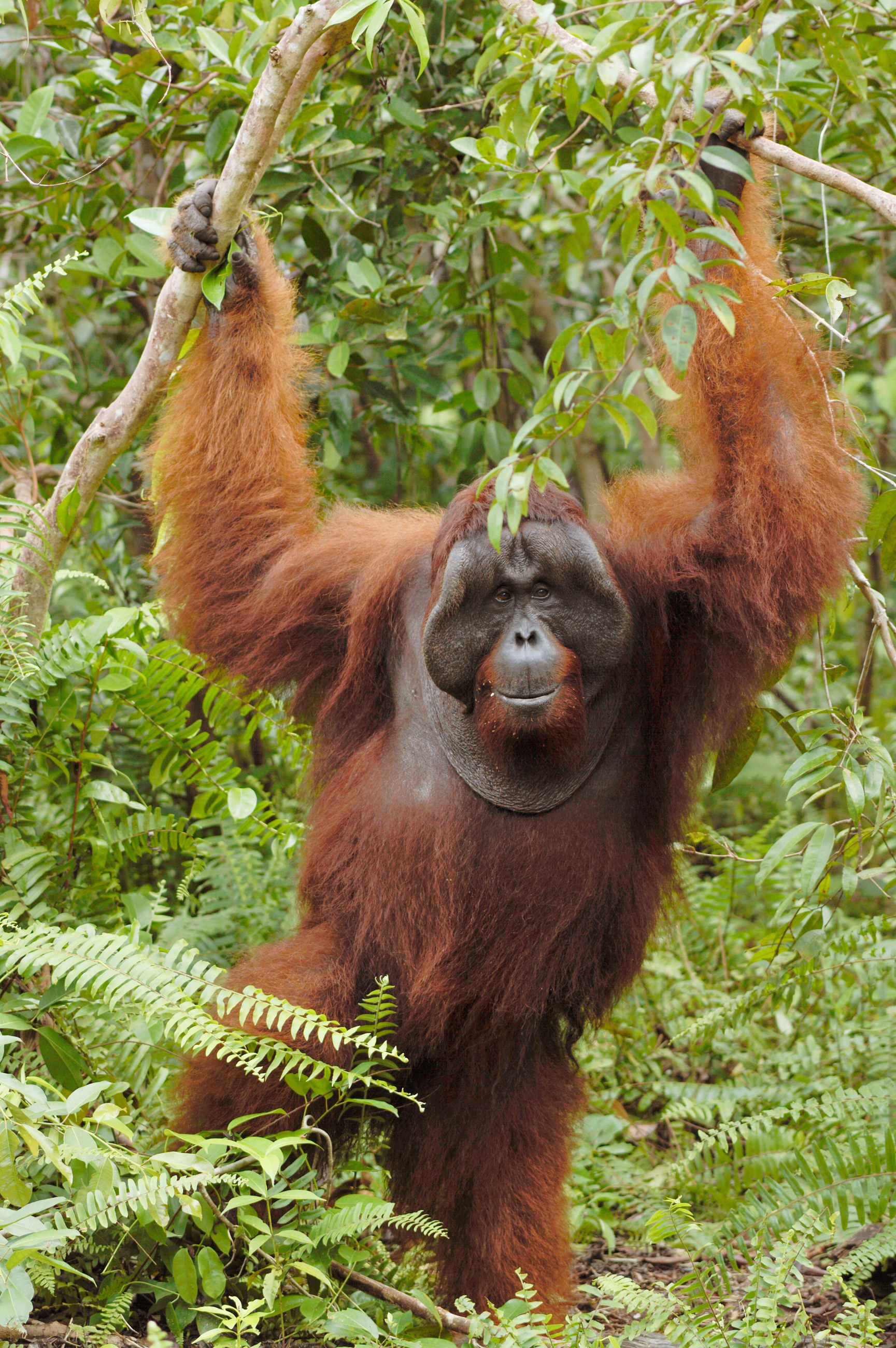
In the late 1980’s Bangkal was an orphaned infant, being kept as a pet. He was rescued, rehabilitated over many years, and then released into Tanjung Puting National Park, Central Kalimantan Indonesian Borneo.
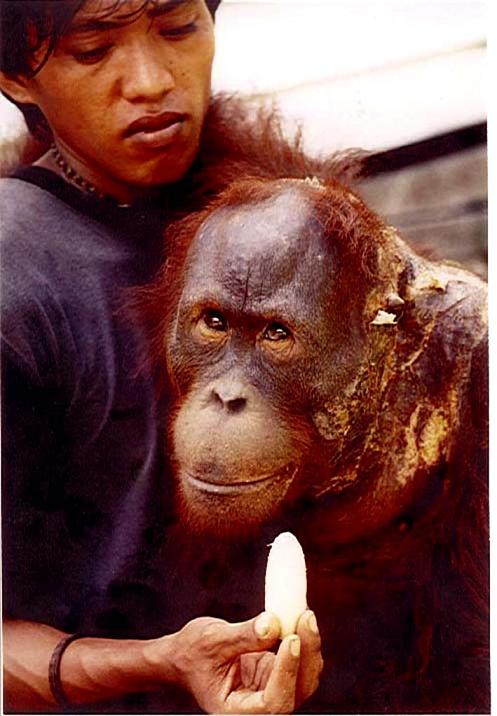
In 2000, when illegal logging was rife in Indonesia’s National Parks, Bangkal became the victim of a horrifying incident. Illegal loggers threw hot oil over him resulting in a burn down his face and neck.
During his recovery, Bangkal protected himself from annoying insects, by using a blanket to cover his injured face. Once recovered, Bangkal was released again but this time into the Lamandau Wildlife Reserve.
Now aged around 28 years-old, cheek-padded Bangkal is magnificent. He is the dominant male around Camp Gemini and is thought to have fathered many offspring.
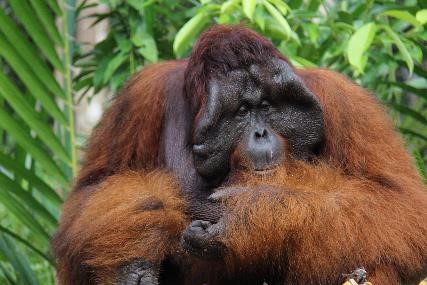
Support Bangkal during Orangutan Awareness Week! Please donate here to help us protect Bangkal in his forest home.
Meet Holahonolulu the orangutan
To celebrate Orangutan Awareness Week, we are telling the stories of some of the orangutans who have been given a second chance thanks to your support for our work. Holahonolulu
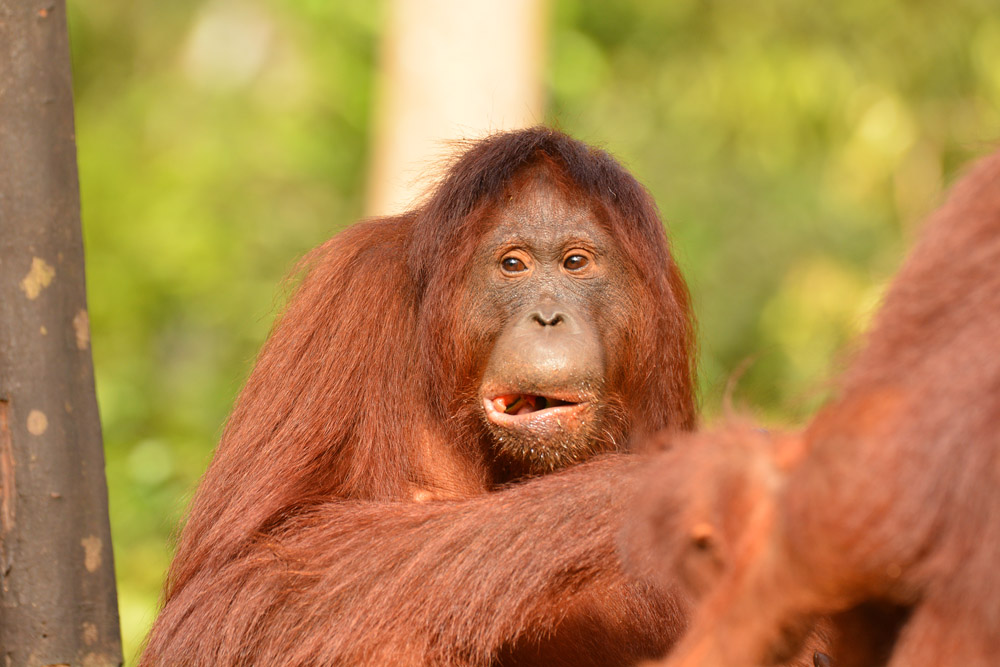
Holahonolulu is a wild born adult female orangutan. Her mother, Huber, was released into the Lamandau Wildlife Reserve in around 2000 and Holahonolulu was born in 2004. Huber unfortunately passed away in 2012.
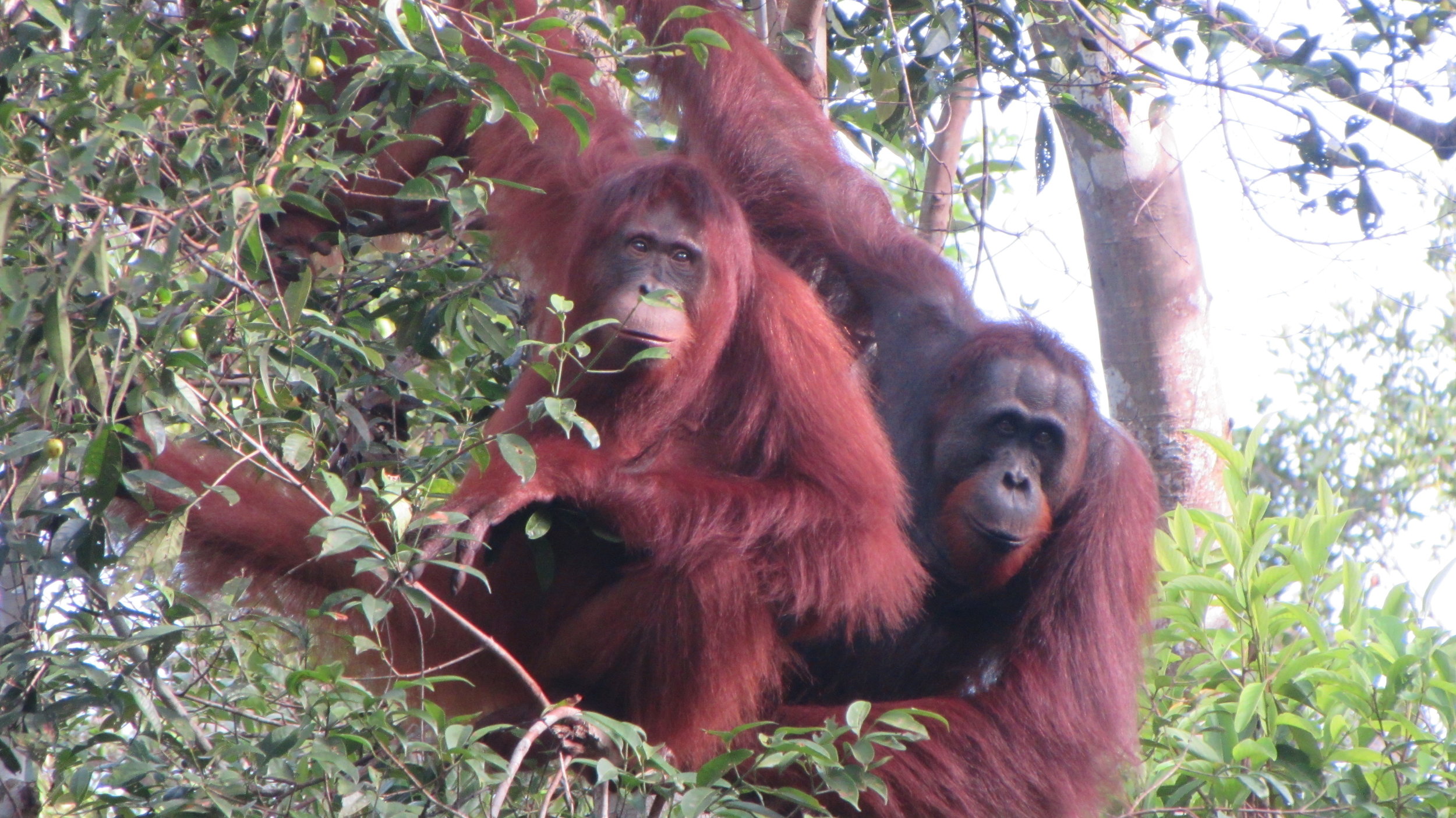
Holahonolulu is often seen by Orangutan Foundation staff at the feeding station, close to Camp Gemini. She been observed with Bangkal, a dominant male, mating on several occasions. Orangutans have a gestation period of about 9 months, it is slightly shorter than humans. Watch this space for the announcement of a new arrival in a few months’ time!
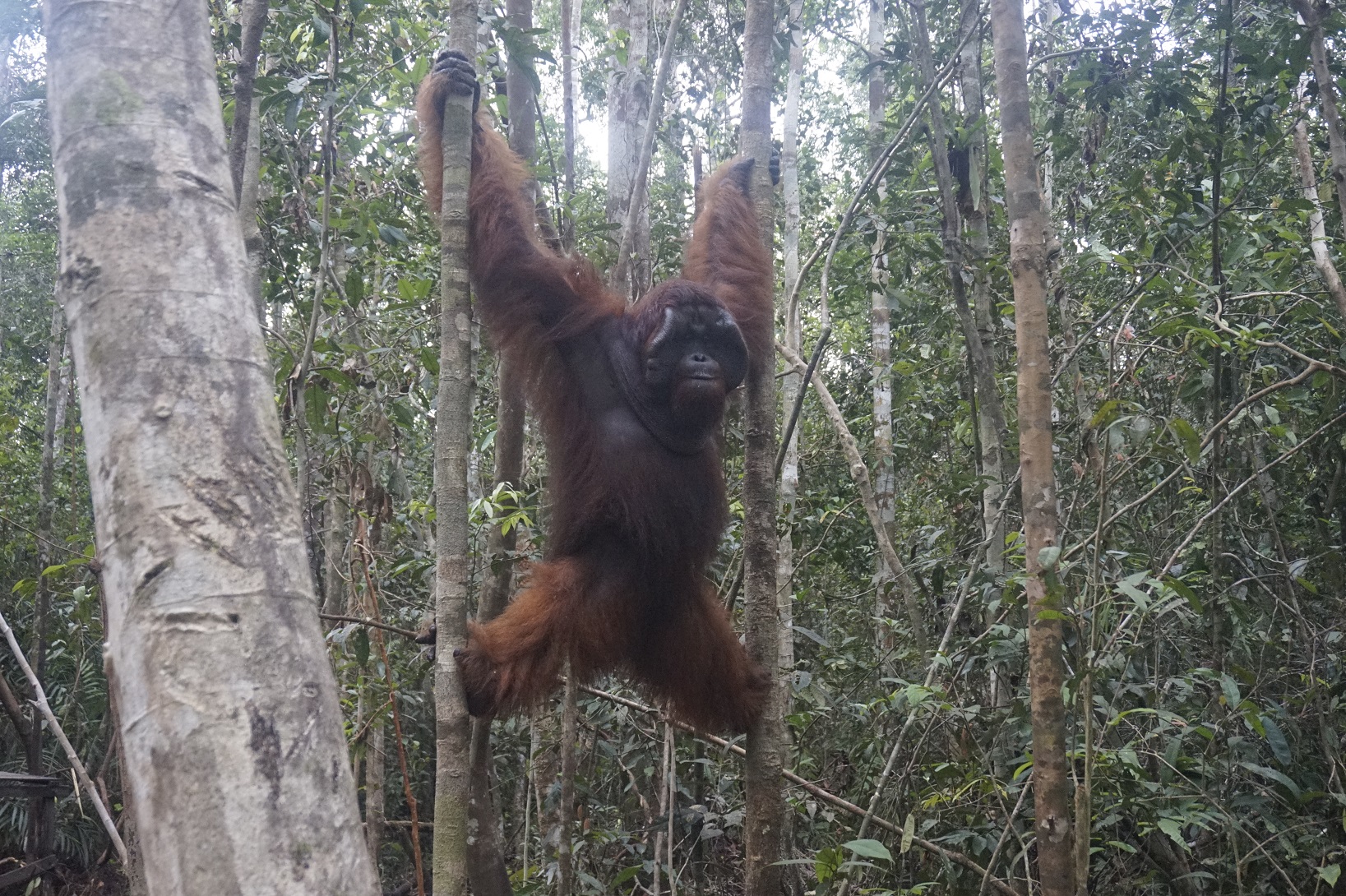
We are delighted when released orangutans go on to produce future generations. The orangutans of Lamandau Wildlife Reserve are now a healthy, viable and growing population.
Support Holahonolulu during Orangutan Awareness Week here! Please donate to help us protect her tropical forest home.







